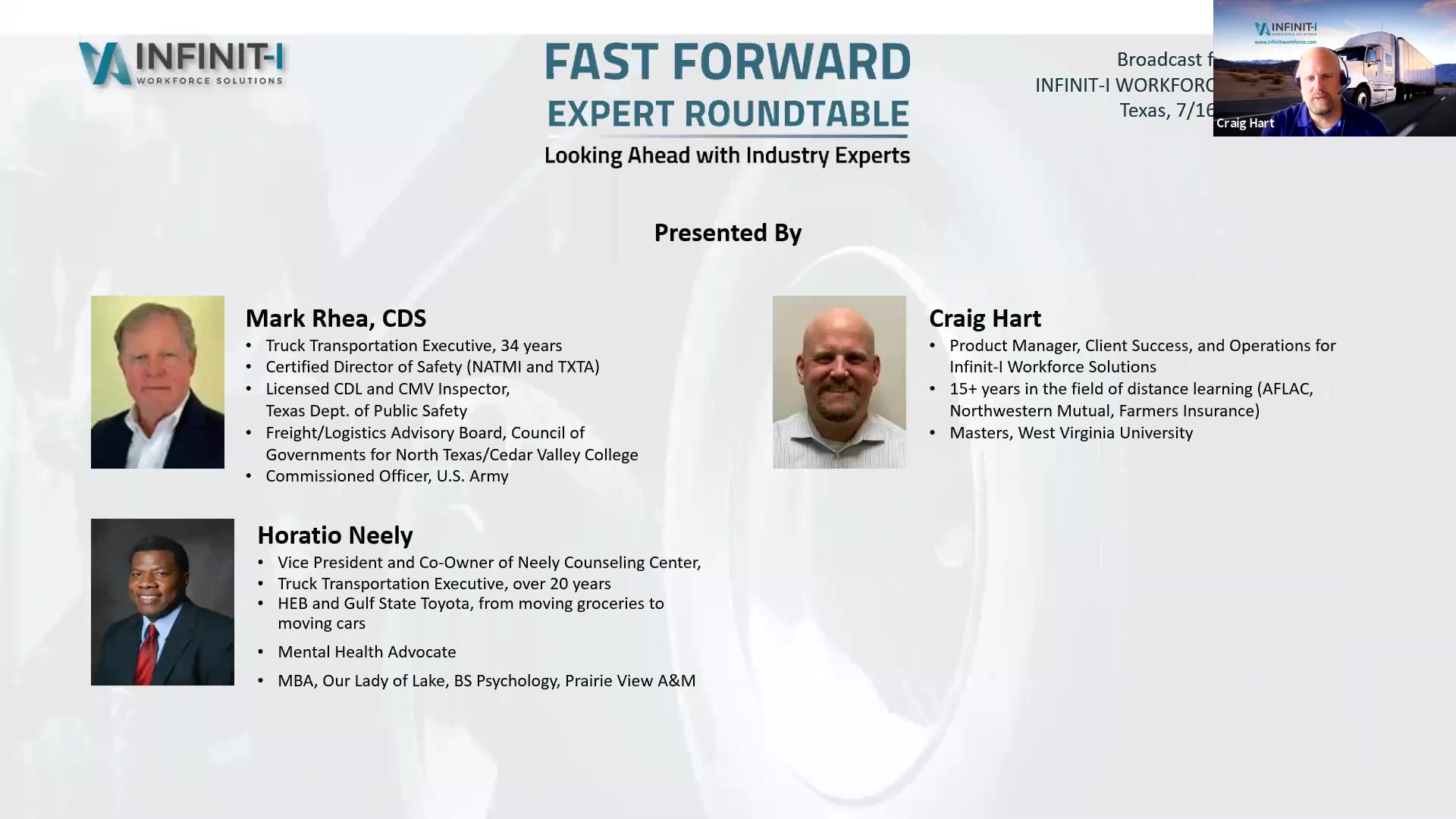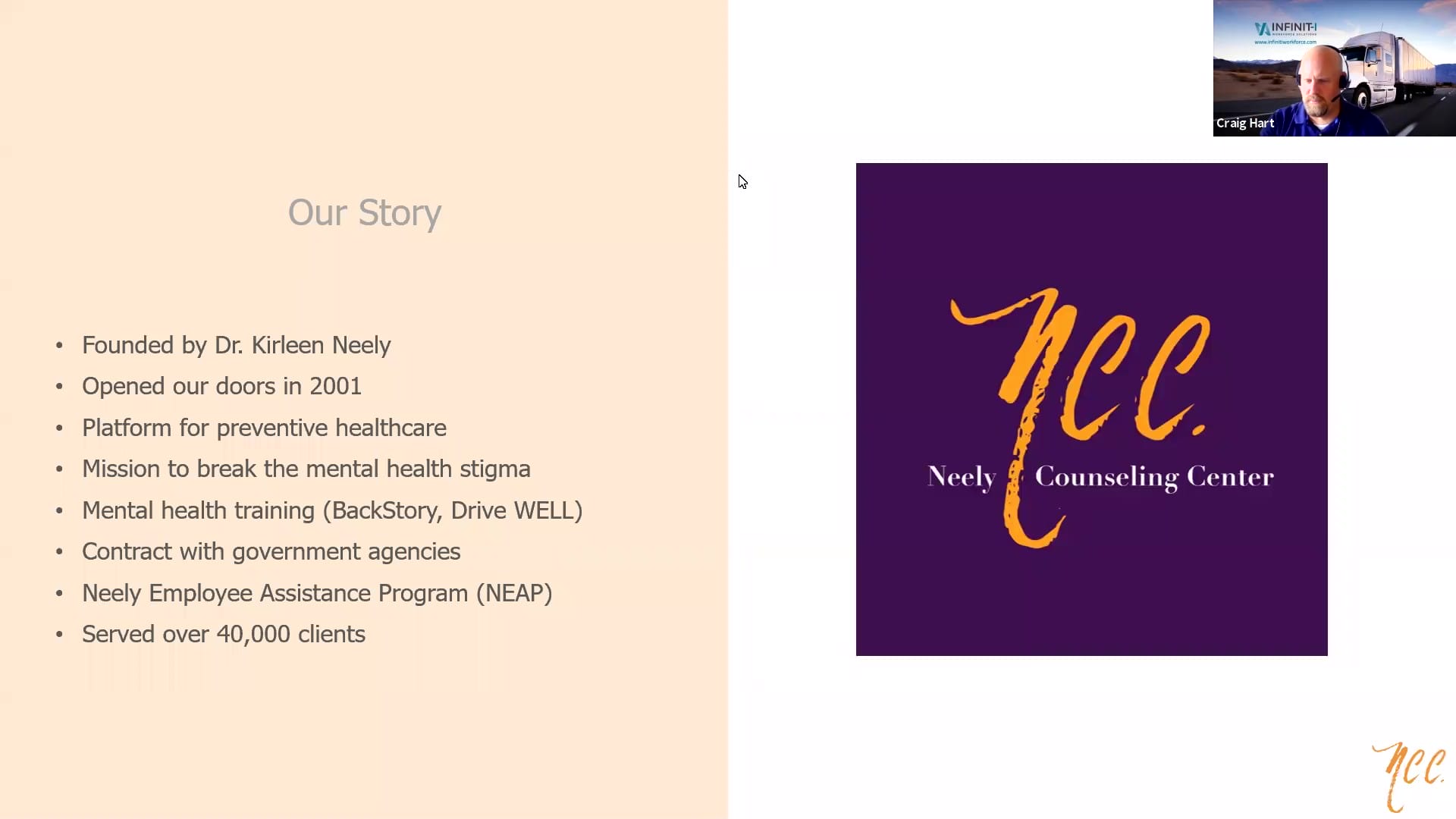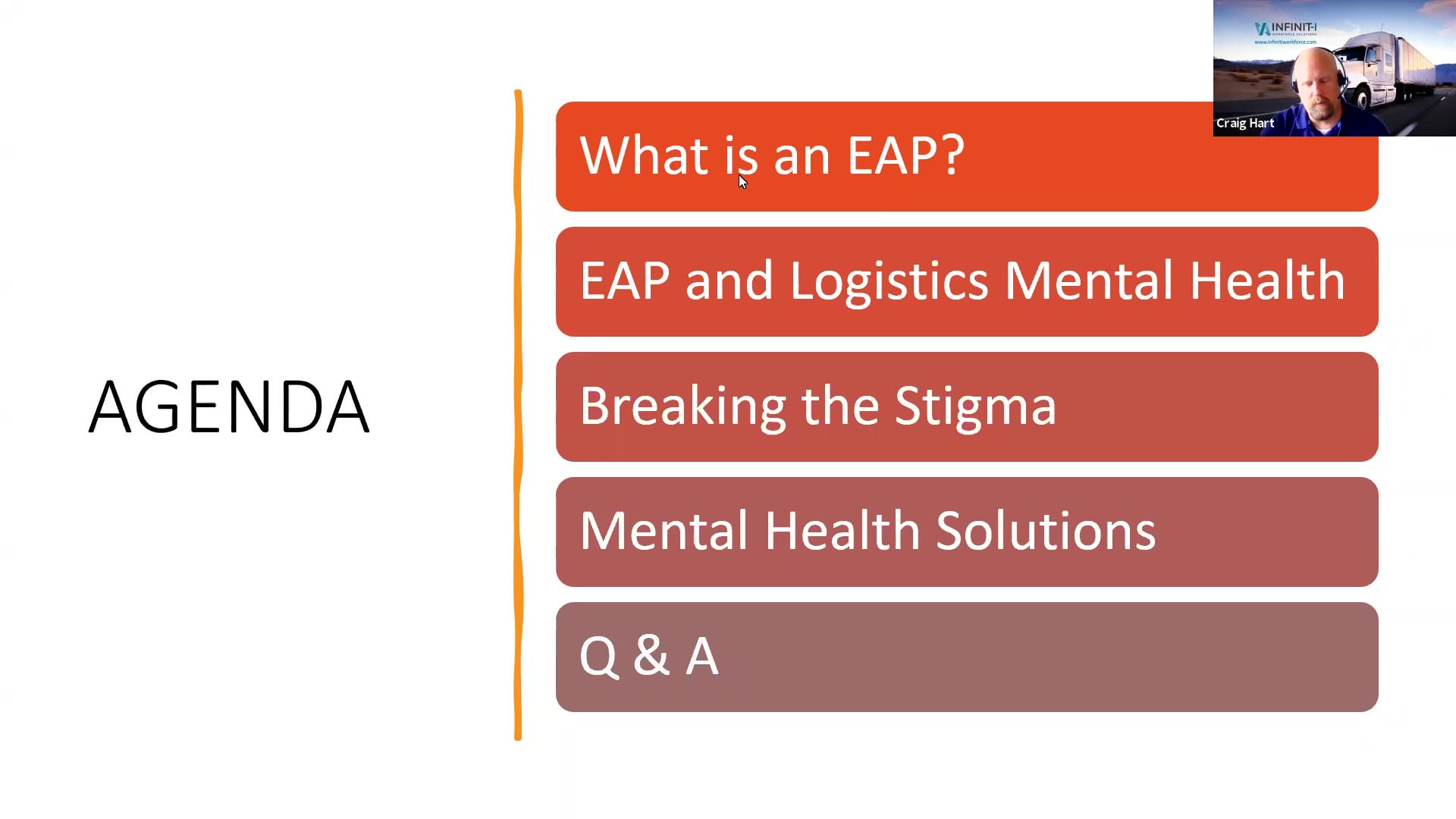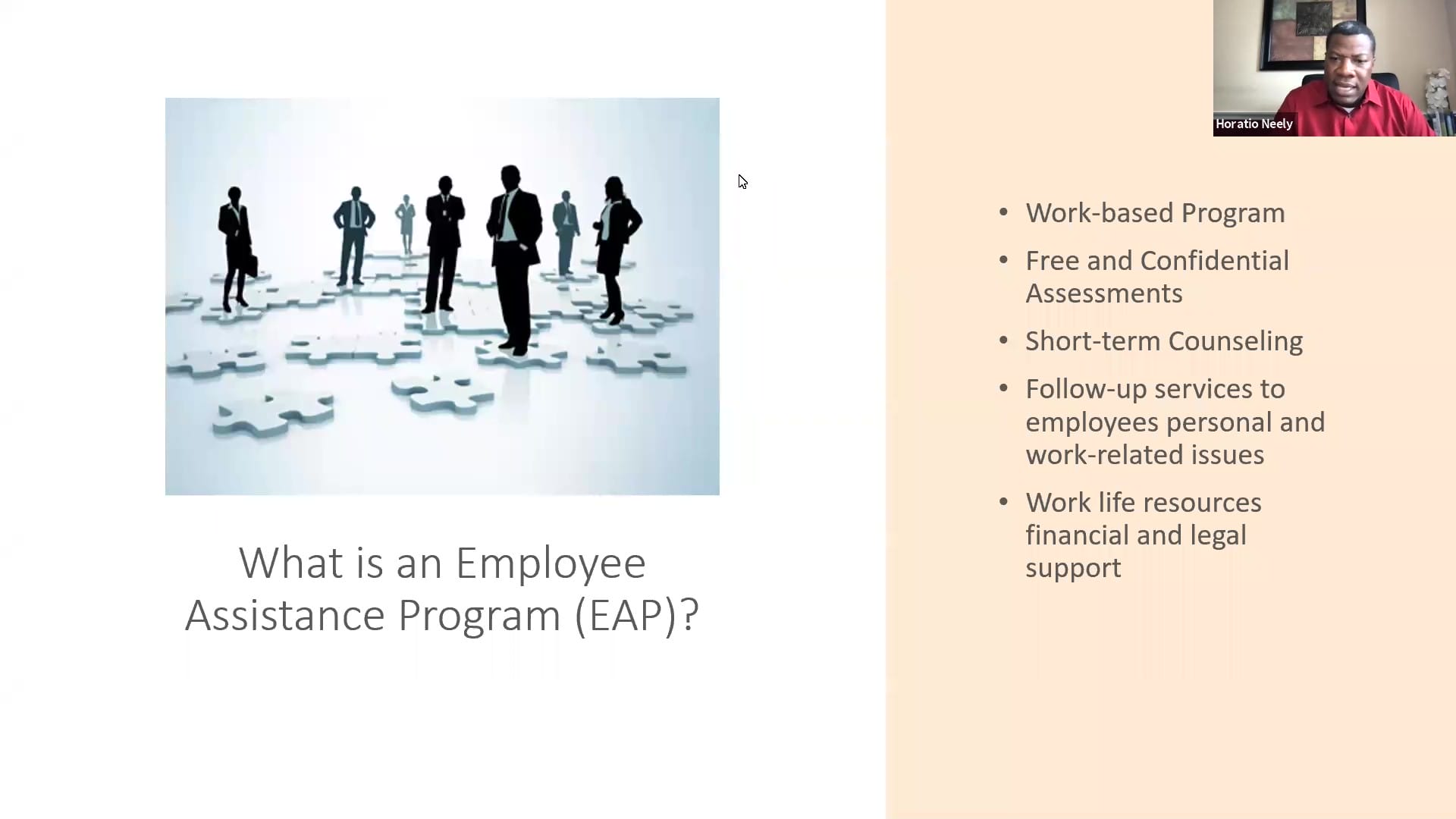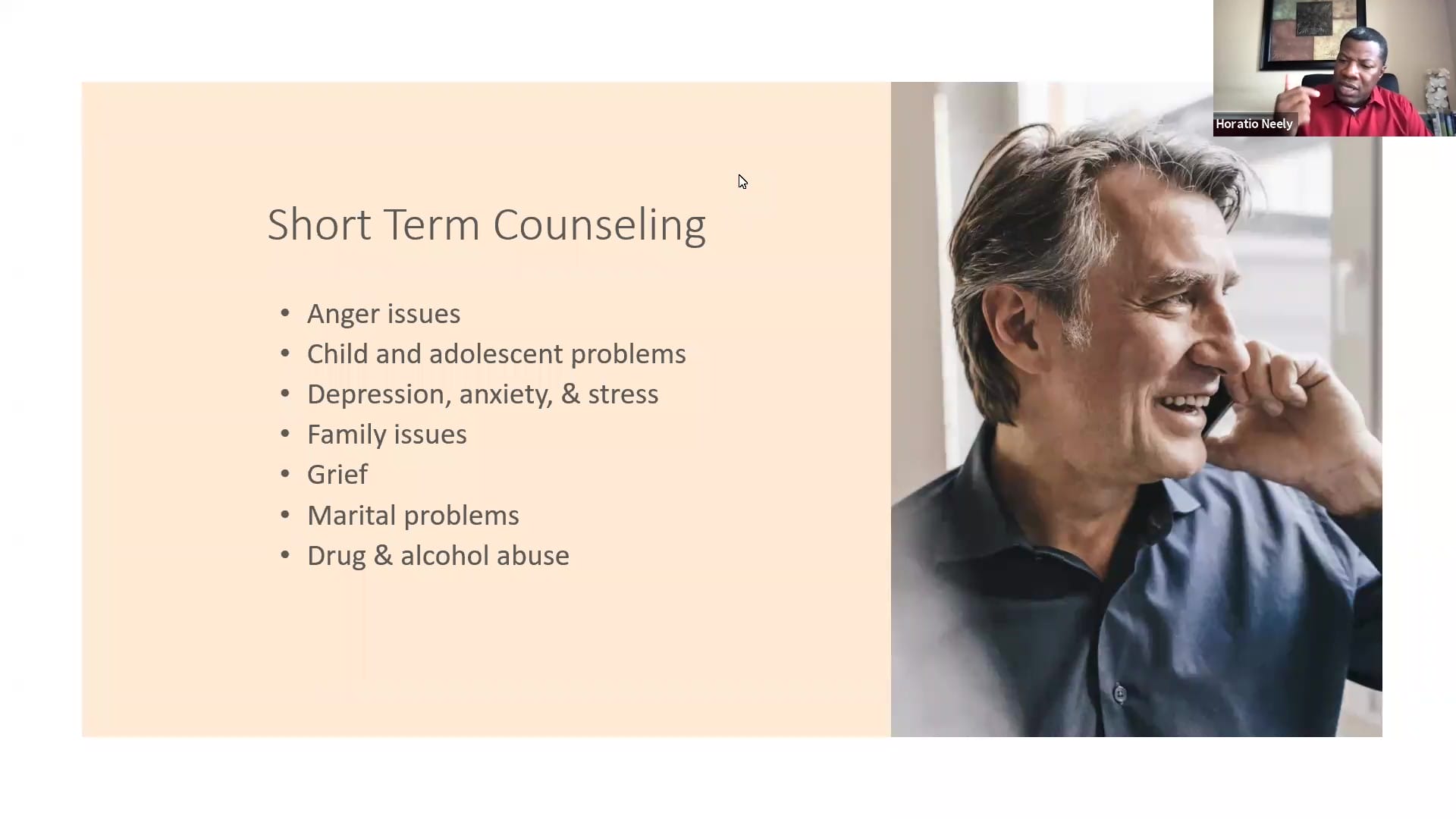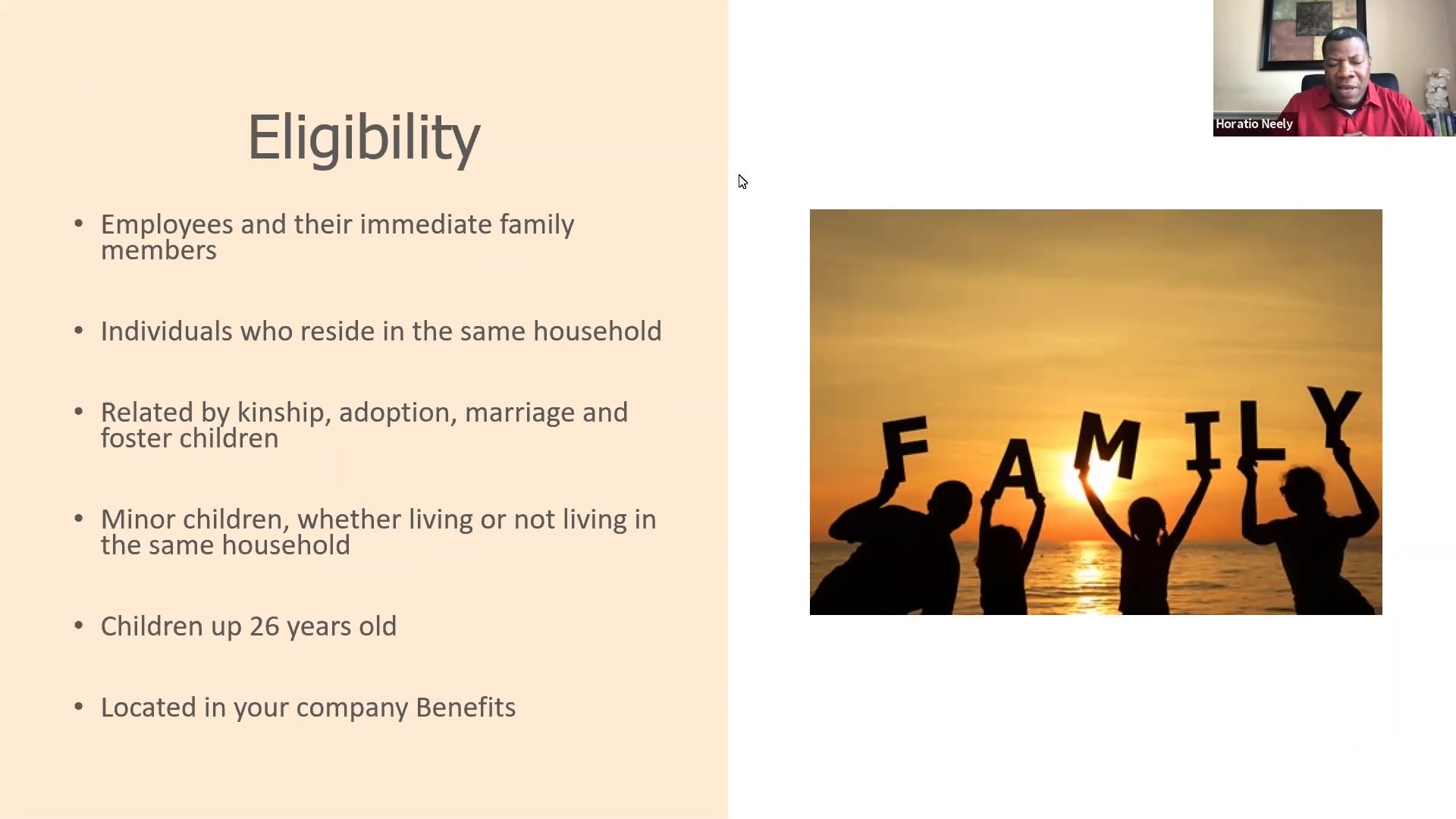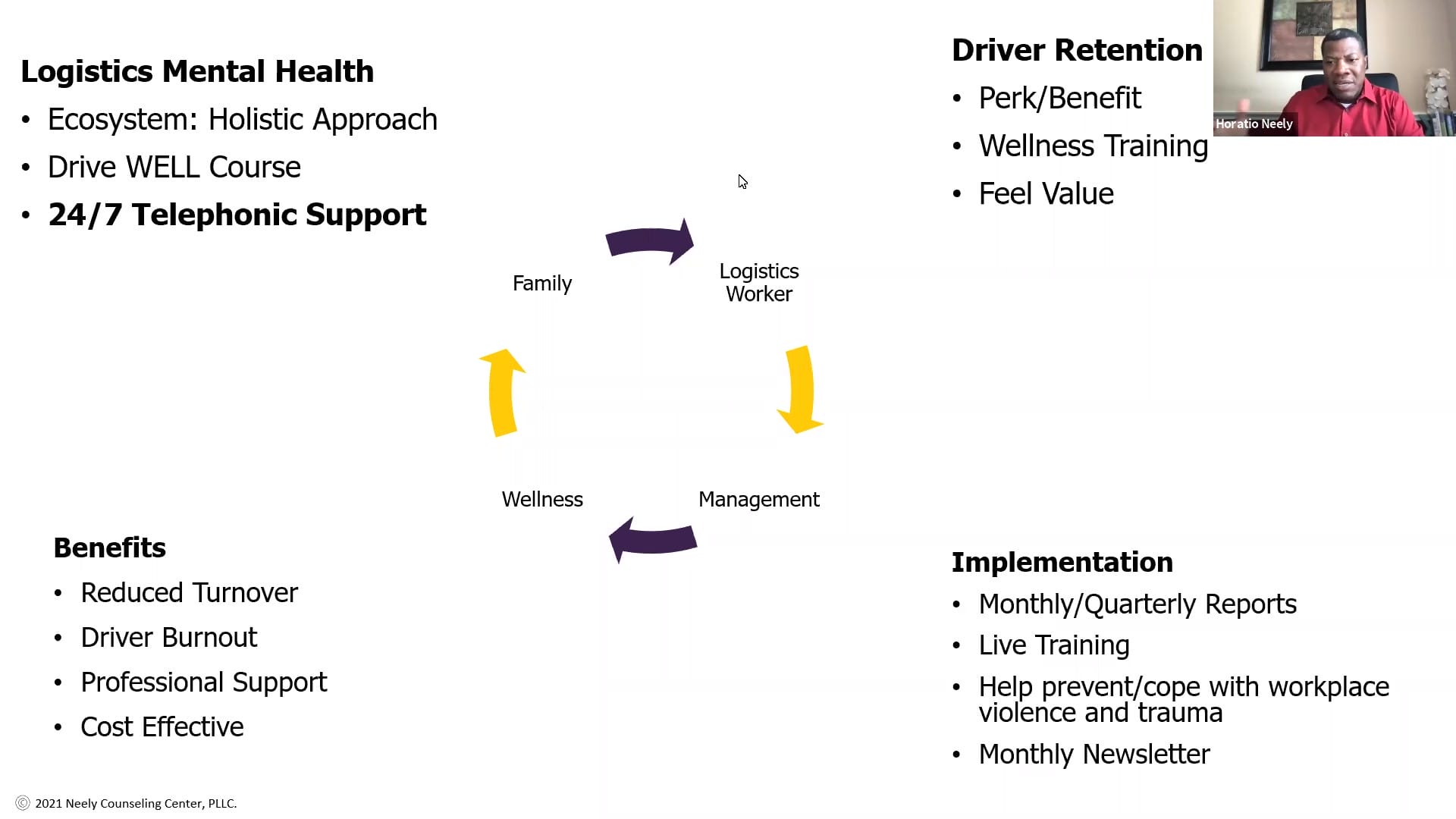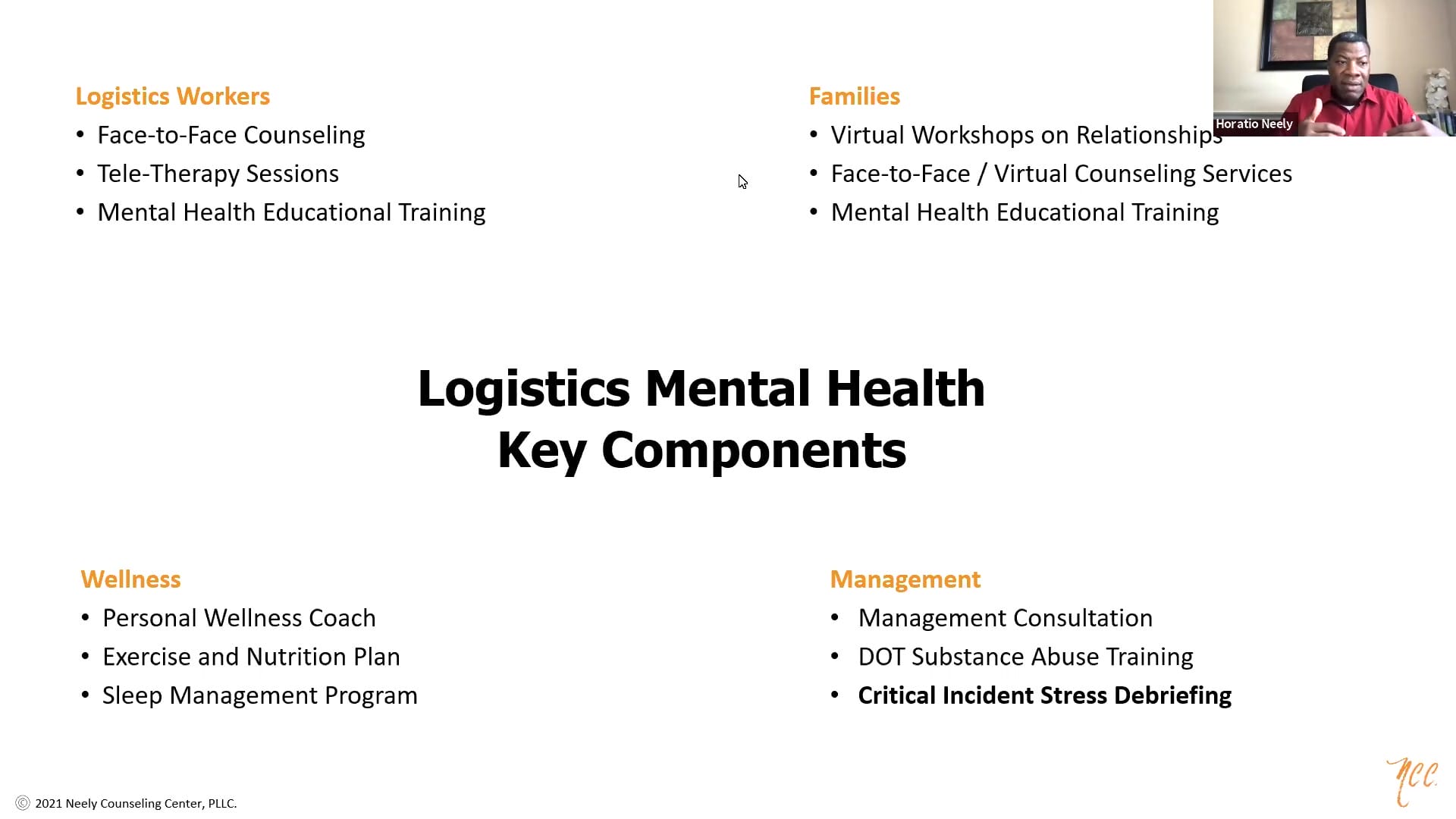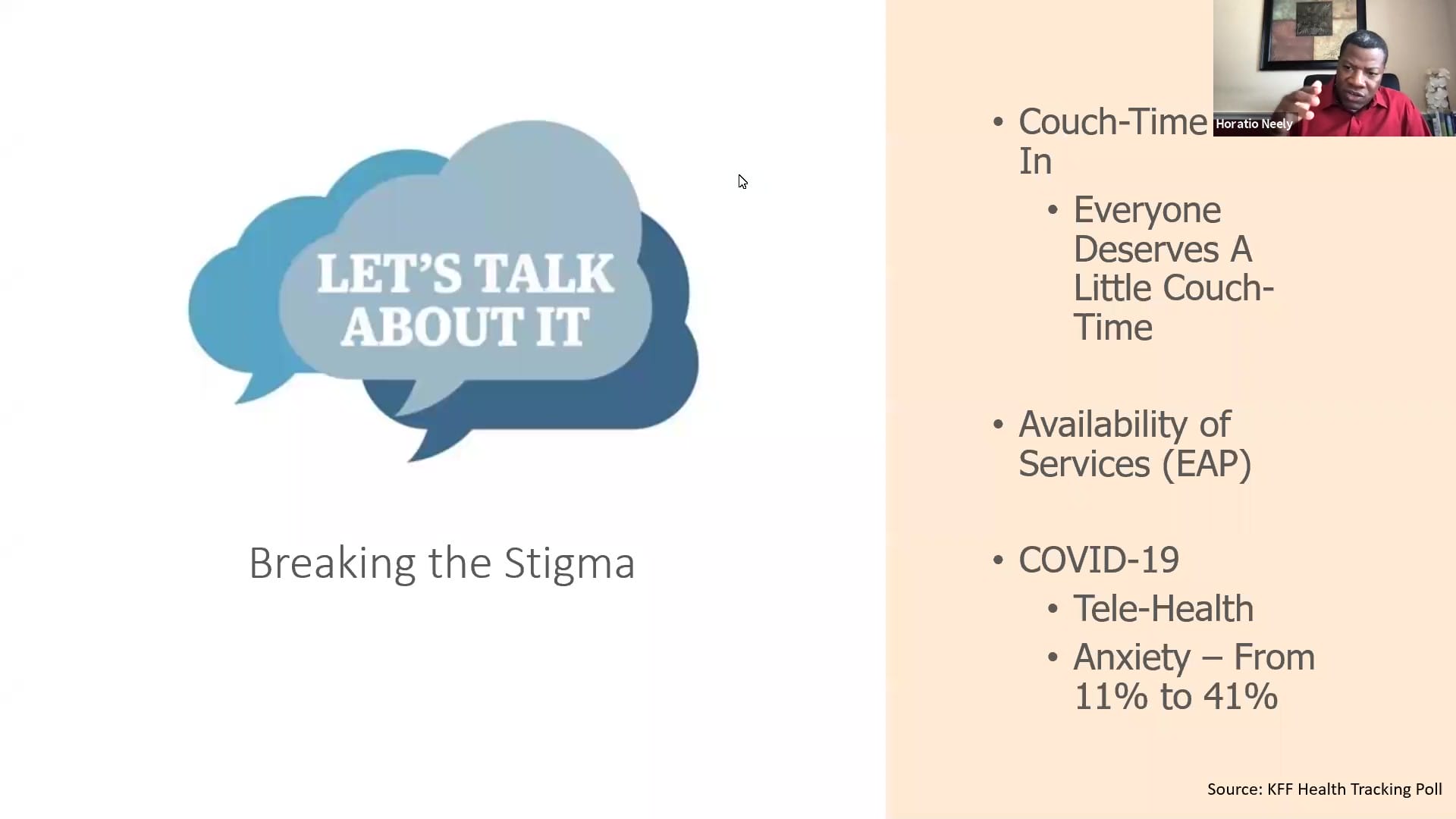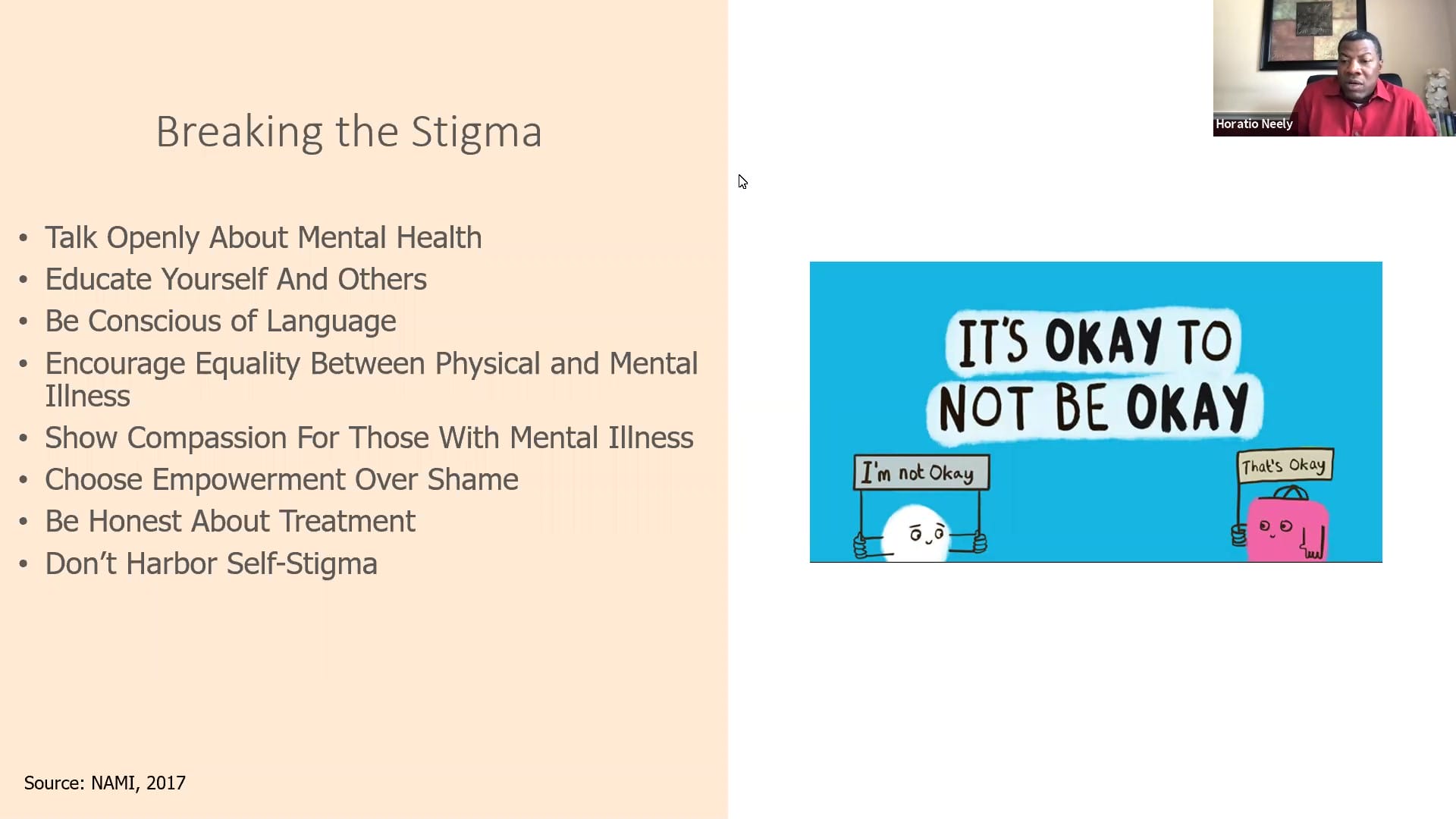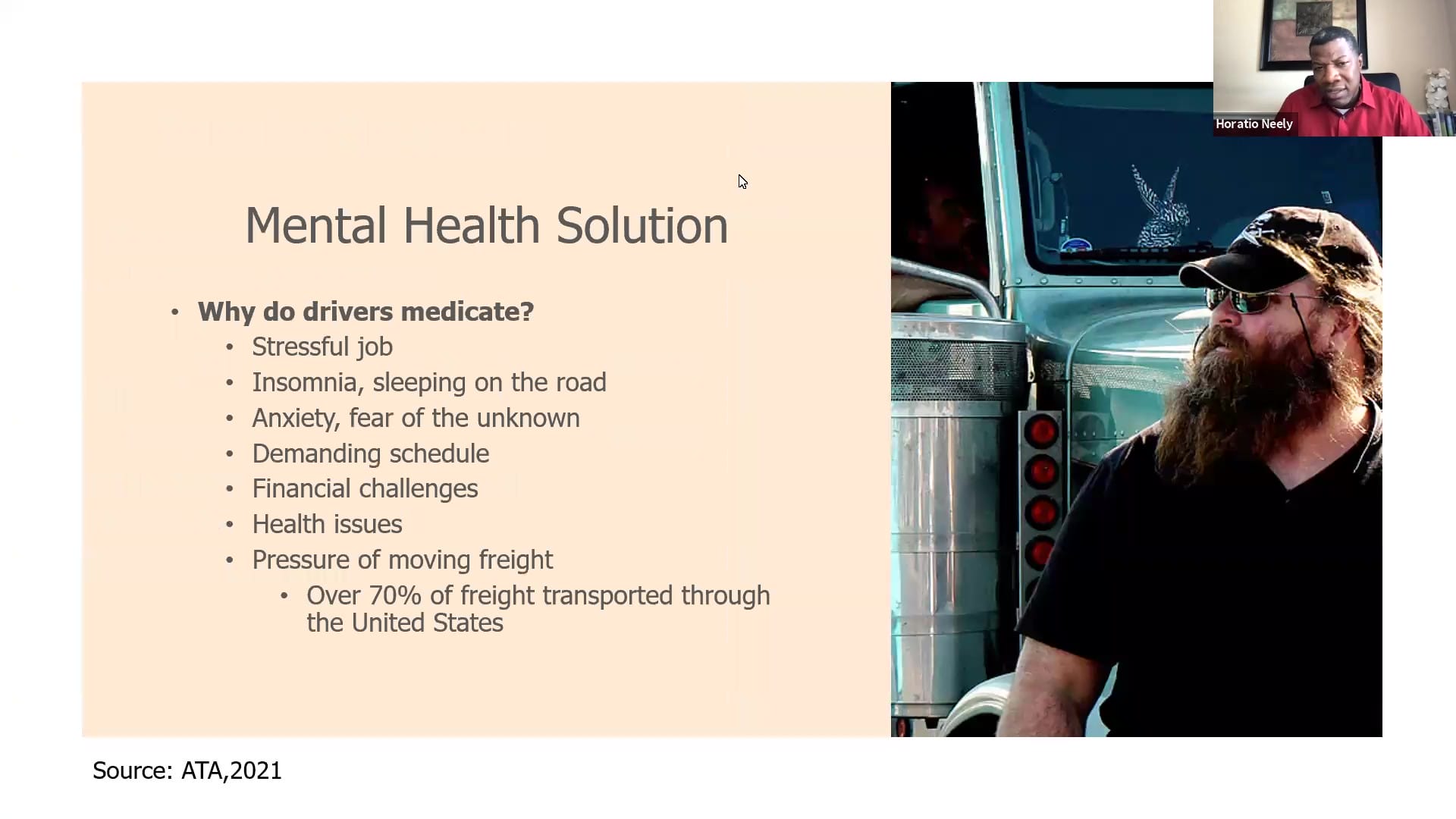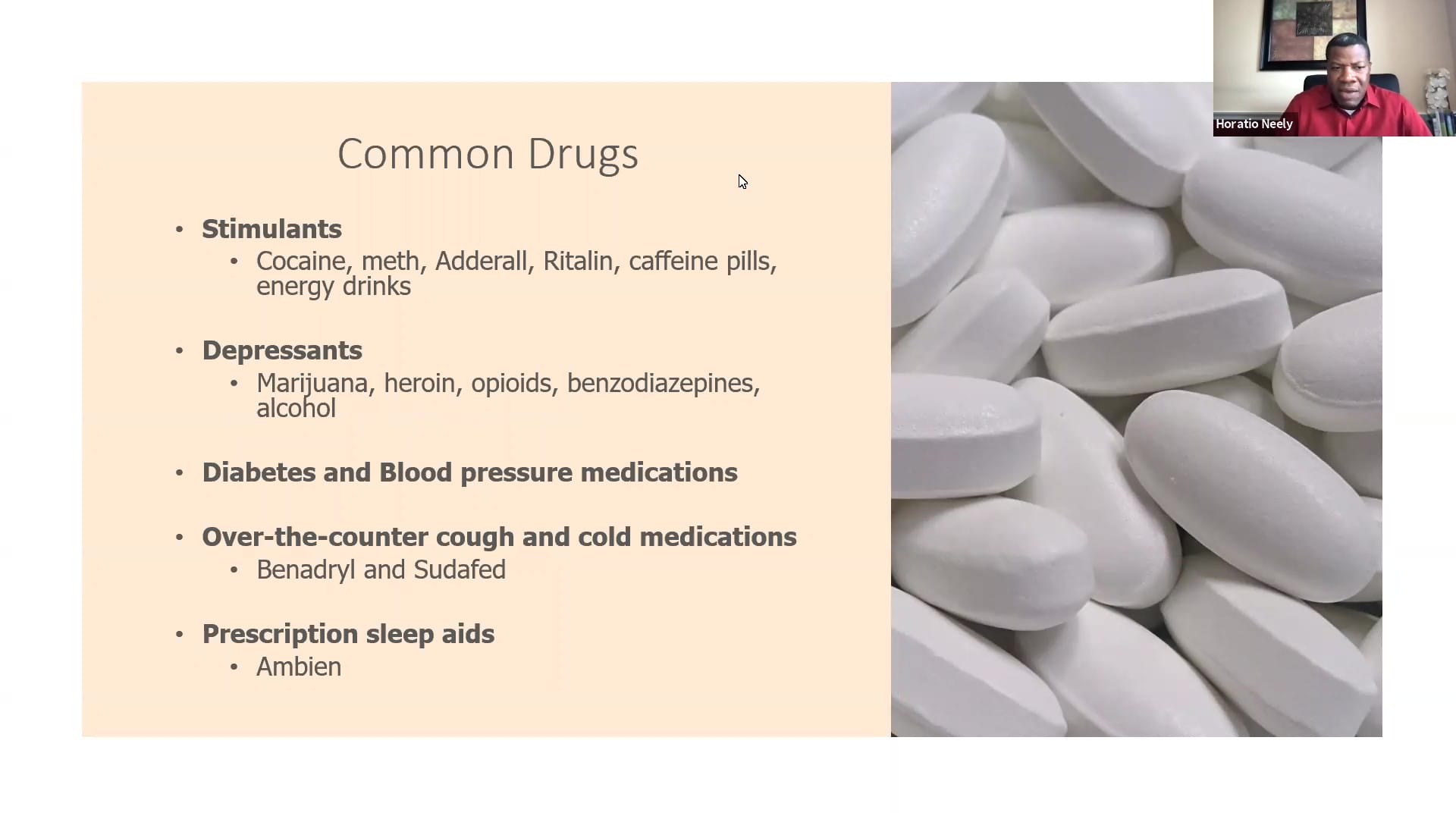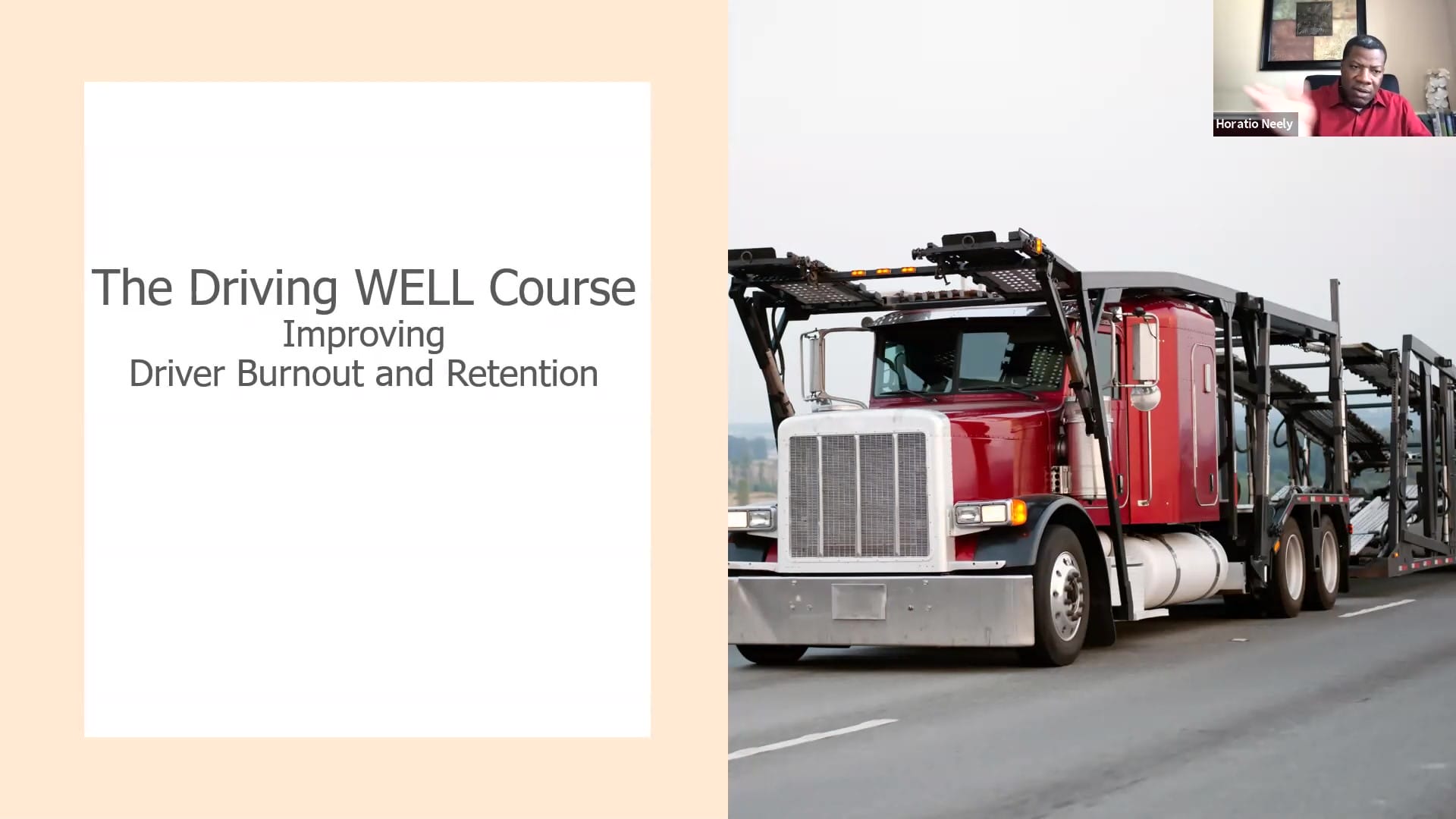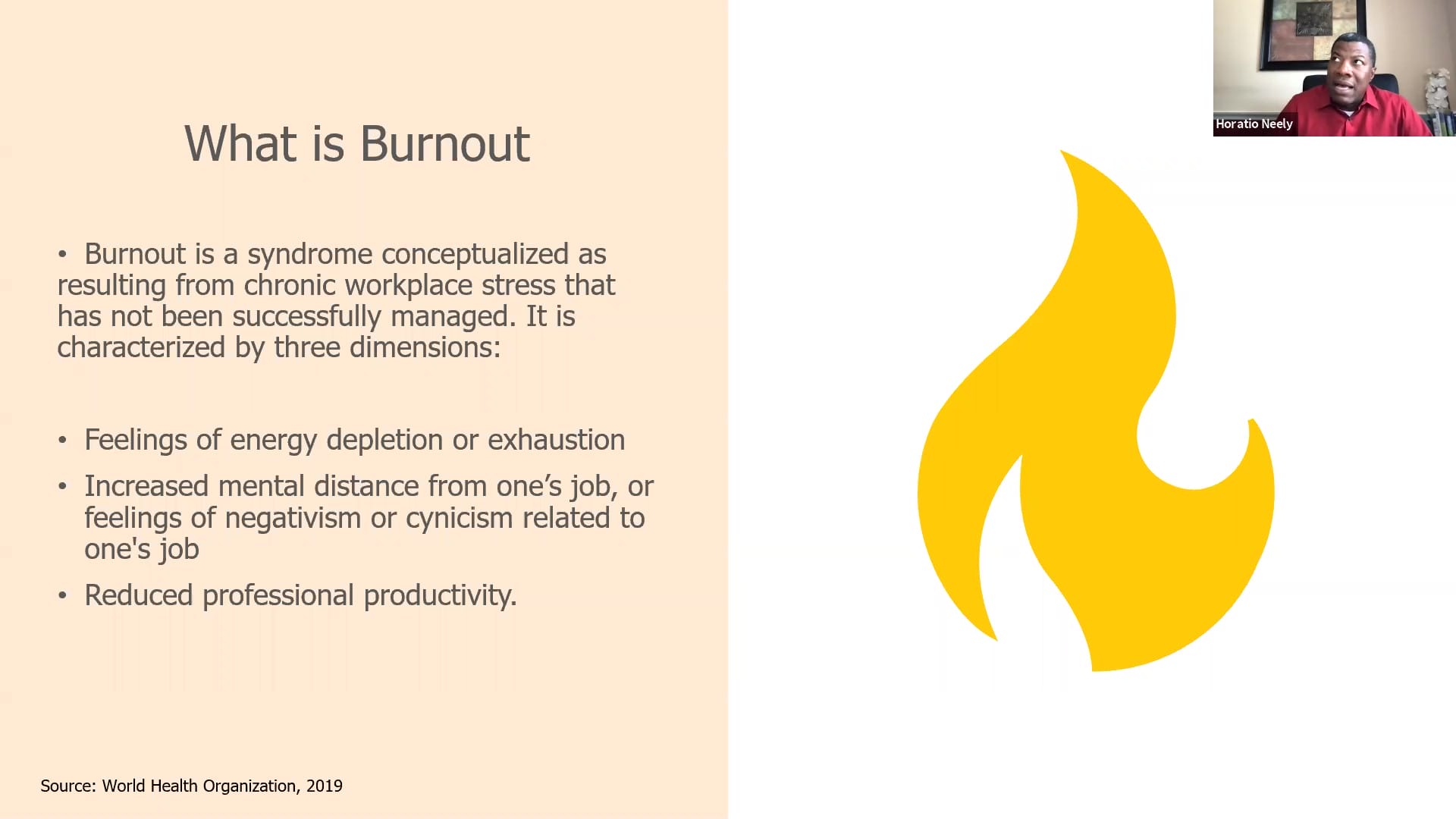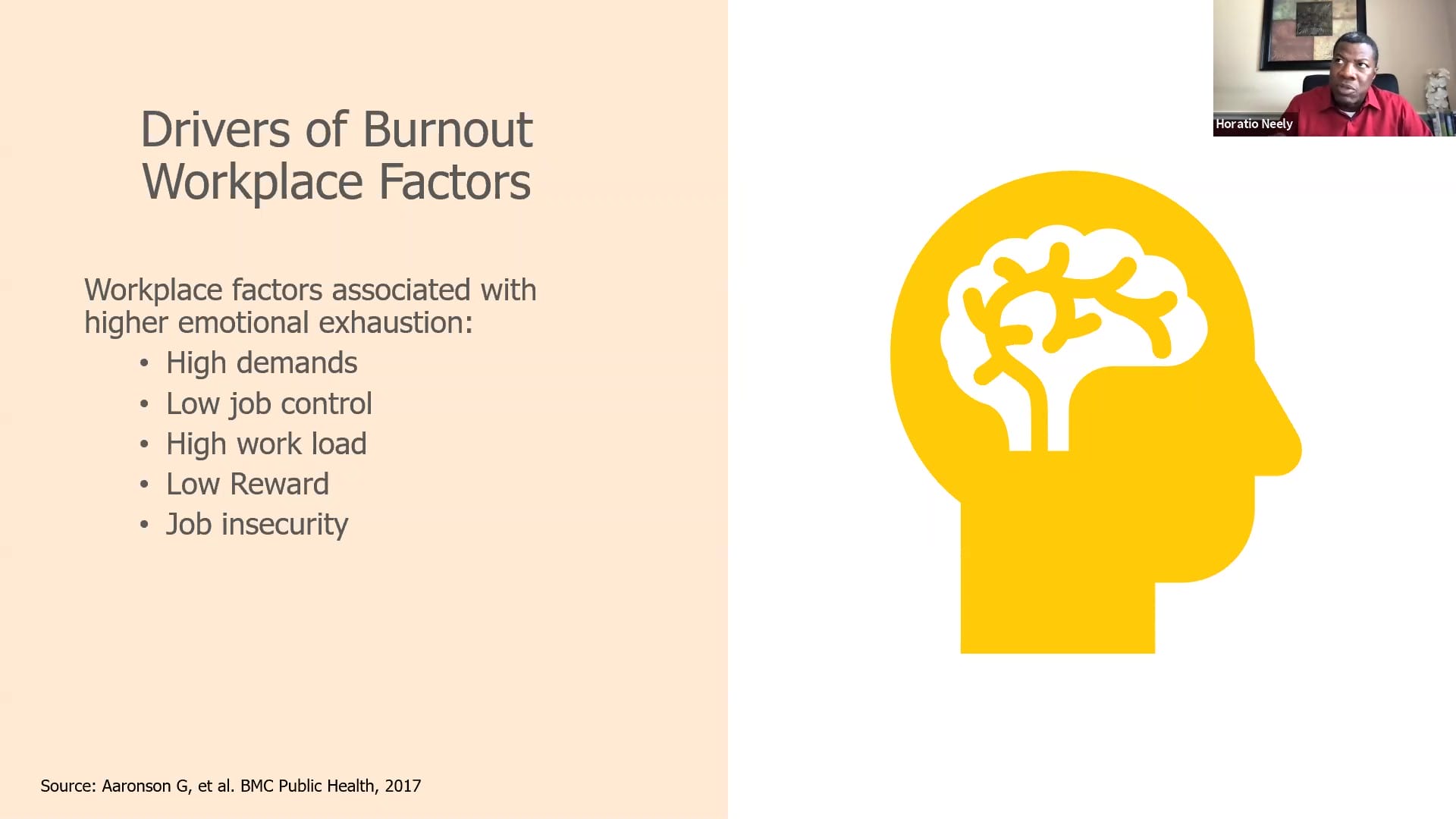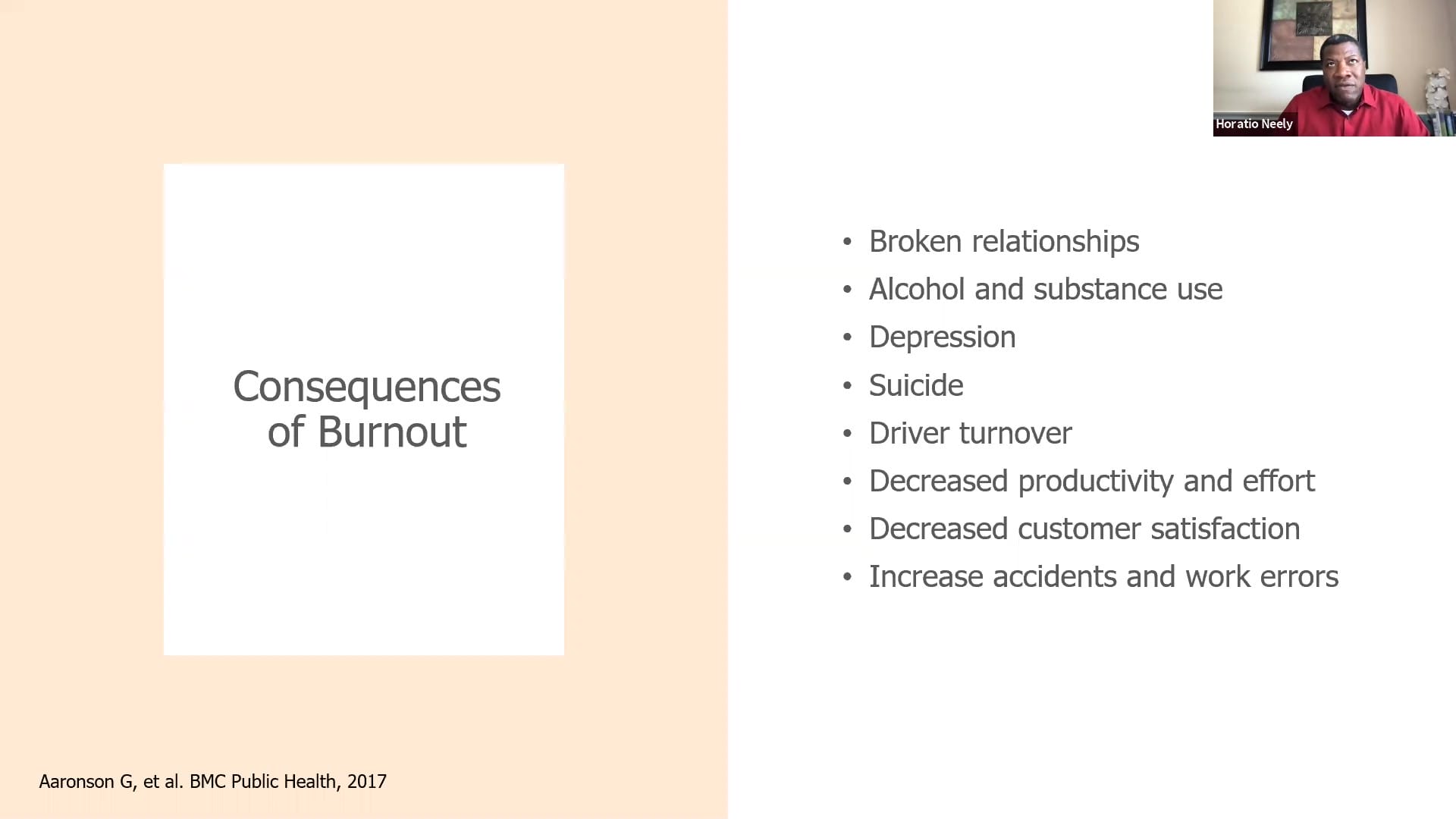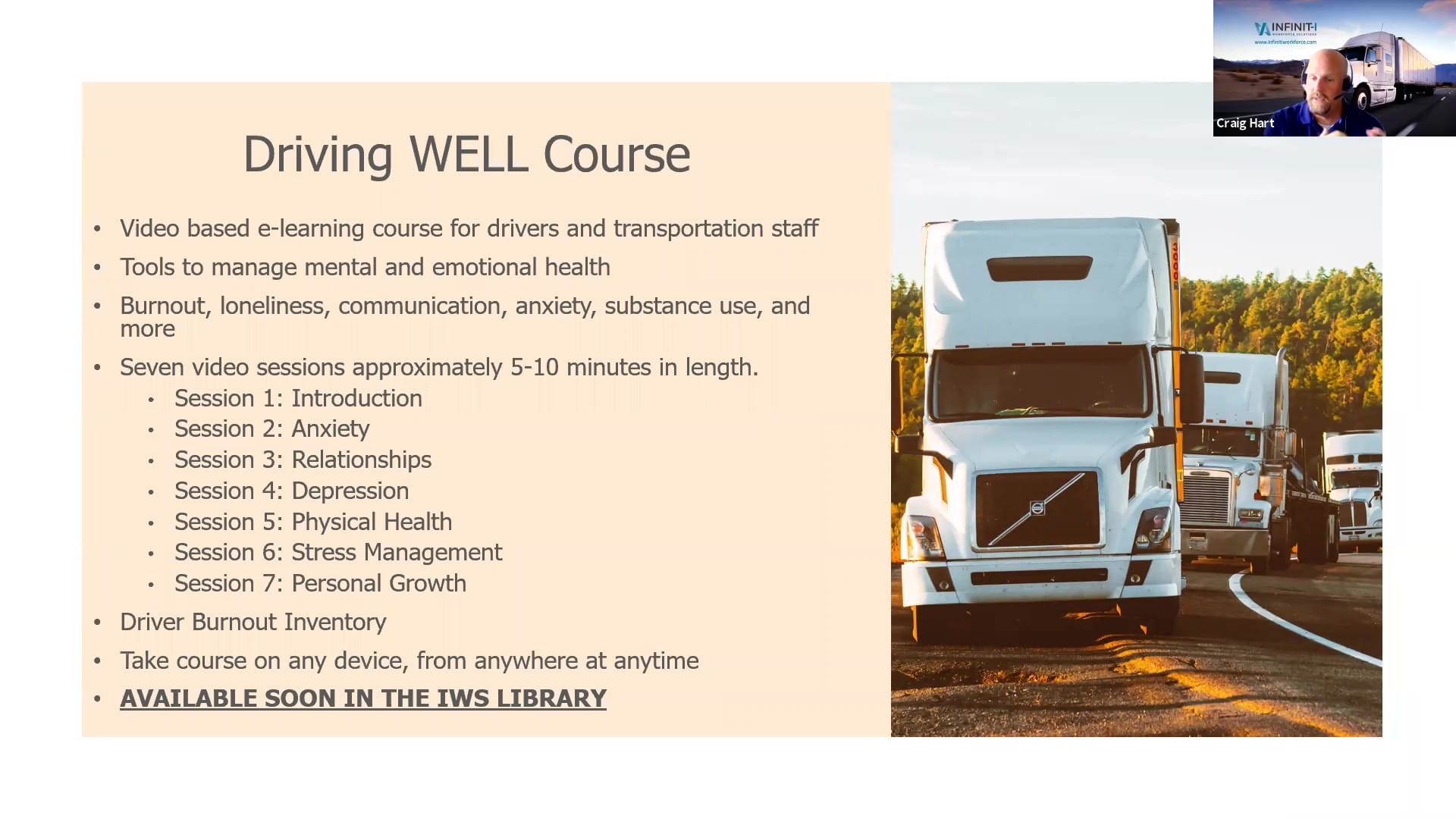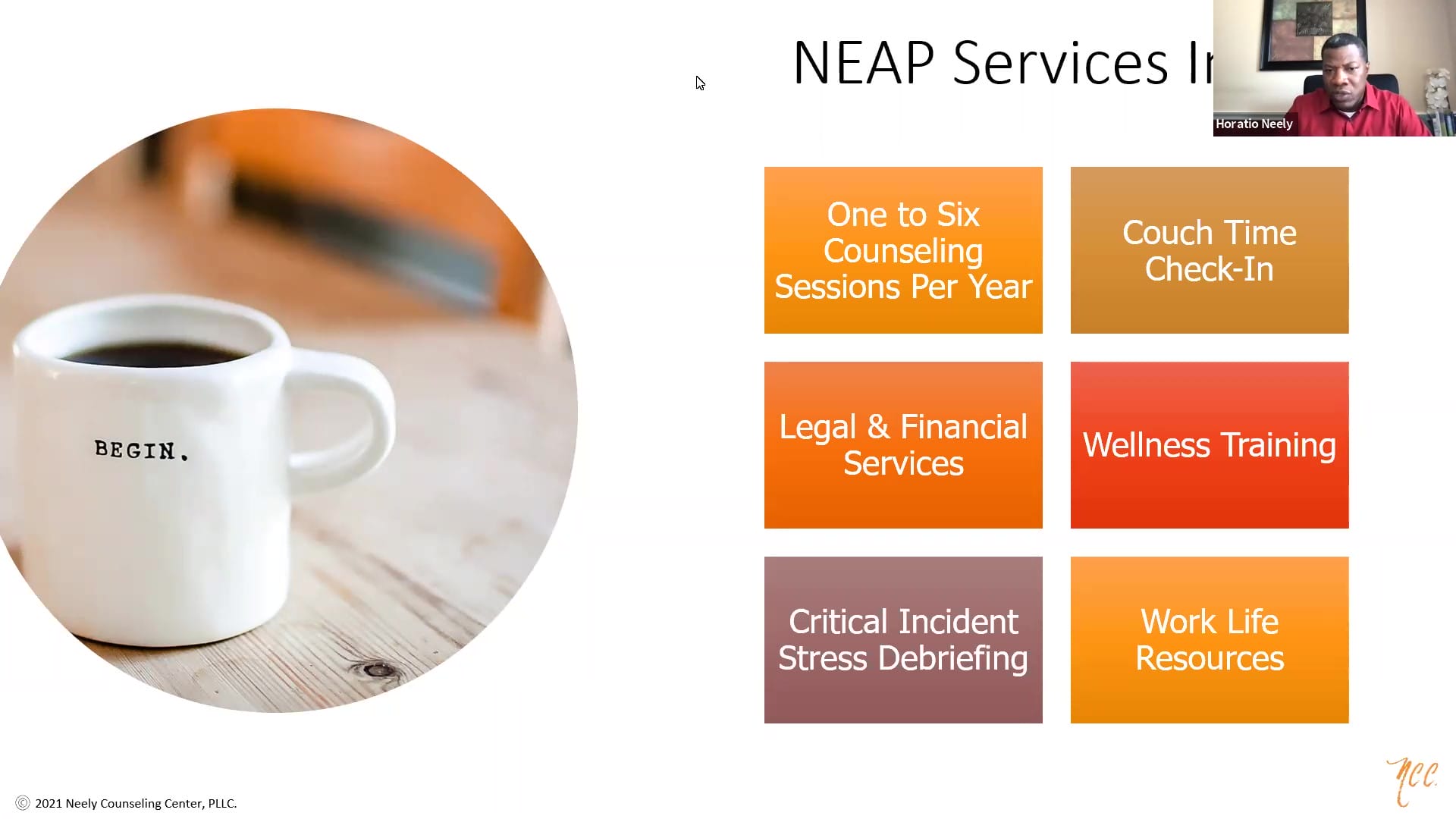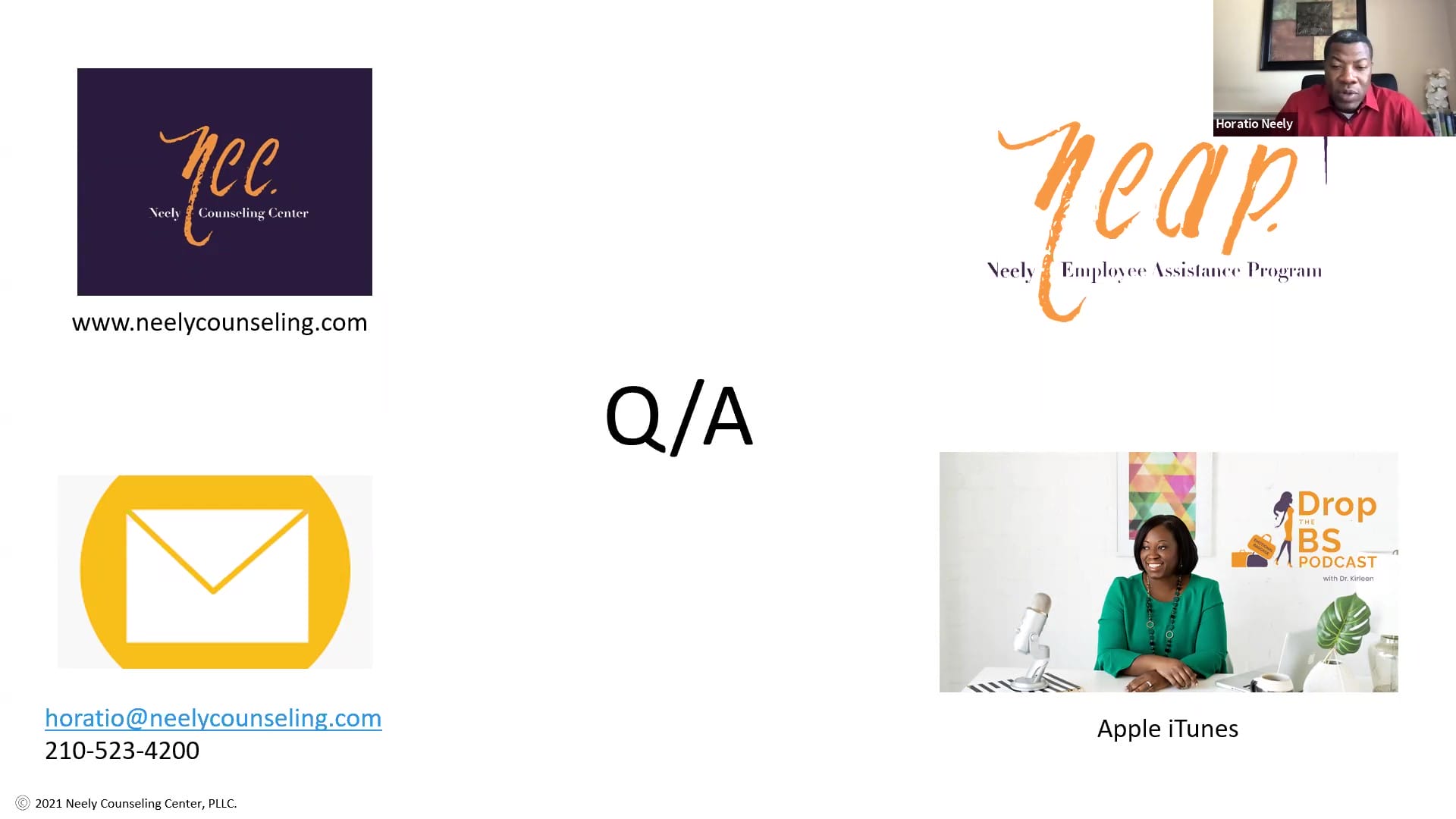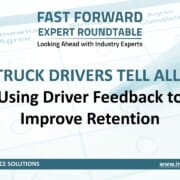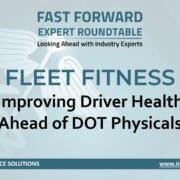Transcription
1
00:00:08.189 –> 00:00:15.360
Craig Hart: Good afternoon, everyone, welcome to our latest edition of the Fast Forward Expert Roundtable.
2
00:00:16.109 –> 00:00:27.600
Craig Hart: My name is Craig Hart, I’m with Vertical Alliance Group today we’re going to be talking about mental health behind the wheel, improving the mental health and attitude in your fleet.
3
00:00:28.410 –> 00:00:37.740
Craig Hart: With me, as always, is Mr. Mark Rhea For those of you unfamiliar with Mark, he is he’s one of you he’s a former trucking executive.
4
00:00:38.340 –> 00:00:47.700
Craig Hart: Over 35 years’ experience in the field, he has now transitioned away from the frontline trucking operations, but remains very much plugged in.
5
00:00:48.240 –> 00:00:56.880
Craig Hart: With industry organizations and advises groups, both within and without the transportation industry and he’s got a great.
6
00:00:57.390 –> 00:01:07.740
Craig Hart: A great mind, because he has been where you have been, and he has seen what you have seen, and probably live to tell the tale and Mark it’s always lovely to see you again, Sir, how are you doing today.
7
00:01:08.070 –> 00:01:26.370
Mark Rhea: I’m fantastic we’ve got a really, great speaker today Horatio Neely difficult issues, the mental side everybody every carrier I’ve talked to a struggling with the driver shortage issue and contributing to that is as disqualifications for physical.
8
00:01:27.630 –> 00:01:44.940
Mark Rhea: problems but they’re also our mental problems that can be addressed through counseling instead of prescriptions and Horatio’s got a great program the driving well program so I’m really looking forward to this, this is a difficult issue, but it is a very real issue.
9
00:01:45.810 –> 00:01:53.010
Craig Hart: And Mark this builds on kind of a series of things that we have been doing and, hopefully, some of our longtime viewers have been paying attention.
10
00:01:54.210 –> 00:02:00.840
Craig Hart: The goal here is to expose you all to new tools that can help make a difference in keeping your drivers with you.
11
00:02:01.320 –> 00:02:09.600
Craig Hart: And there is no magic bullet, there is no one thing that you can do that is going to raise your retention level to where you need it to be.
12
00:02:09.960 –> 00:02:23.400
Craig Hart: In the past we have done webinars on parking and how to do that strategically physical wellness and in this session, we’re doing today is really a springboard off of that first session that we did back in April.
13
00:02:24.000 –> 00:02:30.810
Craig Hart: Because it is a huge component of what’s driving people out of the trucks and off the road and out of the industry completely so.
14
00:02:31.350 –> 00:02:41.790
Craig Hart: Without further ado I’d like to bring on with us today Horatio Neely with Neely Counseling out of San Antonio, Texas good afternoon or Horatio, how are you doing today.
15
00:02:42.150 –> 00:02:44.610
Horatio Neely: hey good afternoon happy to be here guys.
16
00:02:44.910 –> 00:02:54.840
Craig Hart: Excellent now Horatio if you would, could you help set the stage for our listeners today about who you are and who is who is Neely Counseling.
17
00:02:55.350 –> 00:03:05.730
Horatio Neely: yeah so, as you said earlier, you know with Neely Counseling Center. I’ve been around trucking transportation industry for over two decades past 20 years and
18
00:03:06.210 –> 00:03:23.040
Horatio Neely: always teams, you know I cut my teeth in the industry, I went from moving groceries to move in cars, so I started out with ATV and then I moved into what we call Gulf states to the comfort of the trucking company of Gulf states to yield is US Auto Logistics.
19
00:03:24.300 –> 00:03:34.710
Horatio Neely: I am a strong mental health advocate we’ll talk more about how I got into it more, but I will tell you, based on my educational background, when I came into.
20
00:03:35.760 –> 00:03:51.540
Horatio Neely: trucking industry, I quickly realized that there was a gap in reference to that soft skill and I wanted to use my experience to really understand the psychology of the driver and really help others in that environment as well excellent.
21
00:03:52.200 –> 00:04:05.460
Craig Hart: Now a Neely Counseling Center that you mentioned and here’s some particulars for those of you at home, did you want to kind of give the bigger picture view of who nearly is before we dive into more of the logistics side of things yeah.
22
00:04:05.460 –> 00:04:17.220
Horatio Neely: Exactly and I won’t go bullet but I’ll tell you that we’ve been at it for quite some time since 2001 our founder and my partner in crime, Dr. Curly Neely she’s passionate about mental health.
23
00:04:17.640 –> 00:04:24.510
Horatio Neely: And we really look at Neely Counseling Center as a platform for prevented mental health and so a lot of our.
24
00:04:25.020 –> 00:04:42.360
Horatio Neely: products and a lot of the things that we do around mental health training in reference to the backstory breakthrough or drive well or even an EAP is about catching those small issues before they become big and it’s about preventive mental health excellent.
25
00:04:42.450 –> 00:04:53.490
Craig Hart: Excellent alright, so you have now introduced the term EAP to other folks on the phone today, and I know that there’s some of you who have joined us, you may not understand.
26
00:04:54.450 –> 00:05:03.360
Craig Hart: What an EAP is so we want to take some time to help set the stage with some basics, to help with the level of understanding that we can then build from to show you how we’re going to.
27
00:05:04.440 –> 00:05:07.110
Craig Hart: focus on logistics with those sorts of things so.
28
00:05:08.370 –> 00:05:16.710
Horatio Neely: awesome so really you know my story around EAP is personal because when I came into the industry.
29
00:05:17.310 –> 00:05:24.990
Horatio Neely: I had one of the top drivers that was in my team around my team that worked for me and
30
00:05:25.470 –> 00:05:33.720
Horatio Neely: he started to have performance issues to the point to where he had a major accident, whereas the point of no return. He hit someone from behind.
31
00:05:34.440 –> 00:05:49.290
Horatio Neely: And what happened is that, as you unraveled his story, he was having marriage marital problems and he suffered in silence and so out of that scenario I’ve really tried to stay engaged.
32
00:05:50.130 –> 00:05:59.130
Horatio Neely: build a relationship and try to understand you know why do drivers or even support teams suffer in silence, and I think is mostly because of.
33
00:05:59.460 –> 00:06:08.250
Horatio Neely: Not having the right platform of the of the culture for them so when we talk about an EAP is really a work-based program is sponsored.
34
00:06:08.520 –> 00:06:15.210
Horatio Neely: Is free confidential assessments that are provided by companies that sign up for an employee assistance program.
35
00:06:15.690 –> 00:06:29.130
Horatio Neely: And they provide short term counseling, and we’ll talk about the type of counseling that’s involved, but I think more importantly important is follow up services for employees for personal and work-related issues.
36
00:06:29.730 –> 00:06:36.900
Horatio Neely: Because typically we just think about the driver at work, but we never talked about that home life for drivers away.
37
00:06:38.130 –> 00:06:47.730
Horatio Neely: And then, of course, when you hear EAP a lot of people think about financial and legal support, but with such on-work life resources as well.
38
00:06:48.180 –> 00:07:00.540
Craig Hart: Okay, and for those of you on the call some of you may be going hey I have any EAP through my health insurance provider and that may be entirely possible the gap as an organism is not new.
39
00:07:01.410 –> 00:07:11.040
Craig Hart: But the question that I would pose to you from the audience is the EAP that you are currently with or using is that.
40
00:07:11.730 –> 00:07:27.270
Craig Hart: Specific to your industry or is that the typical offering that a larger carrier like a Blue Cross Blue Shield, for example, would make available to any client that they have regardless of industry so that’s kind of where I want your head at as we move forward through this.
41
00:07:29.580 –> 00:07:40.230
Horatio Neely: yeah, and so we talked about short term counseling, and you know the range of issues, you know dealing with grief family issues, marital problems, really drug and alcohol abuse.
42
00:07:41.040 –> 00:07:51.900
Horatio Neely: Having issues at home with your kids, adolescence problems, and I’ll put depression, anxiety, and stress on that on that single bullet because it often.
43
00:07:53.700 –> 00:08:00.420
Horatio Neely: What we know to be true is that clinically depression, anxiety, and stress can be diagnosed clinically.
44
00:08:00.840 –> 00:08:22.230
Horatio Neely: But EAPs are really from our issues of depression, anxiety, and stress, and so the whole process is to catch those issues before they become big because we know that inevitably depression, anxiety unchecked can lead to suicide and all kinds of craziness.
45
00:08:22.590 –> 00:08:35.310
Mark Rhea: ratio I got a quick question what are some general observations that you’ve made that our clients can use to help possibly identify some of these issues.
46
00:08:36.510 –> 00:08:38.250
Horatio Neely: So, when you think about.
47
00:08:39.510 –> 00:08:51.390
Horatio Neely: And he doesn’t have to be, or he or she doesn’t have to be your top driver, but a driver that’s typically in a good mood that’s always checking in a dispatch full of jokes.
48
00:08:51.780 –> 00:09:01.530
Horatio Neely: And then, one day, they are just solid and then that turns into a week that turns into two weeks, and so, being aware that hey something’s changed with.
49
00:09:02.100 –> 00:09:16.620
Horatio Neely: With that, with his or her moves something’s happening with that person, and you can see it, you could you know their regular behavior and so that tells you that you need to unravel and figure out that there’s a bigger story happening with that person.
50
00:09:18.510 –> 00:09:21.540
Mark Rhea: So just change of normal personality.
51
00:09:21.840 –> 00:09:29.760
Horatio Neely: yeah person, and I would tell you being around the trucking industry that it’s full of vibrant and different personalities.
52
00:09:30.300 –> 00:09:47.280
Horatio Neely: And those personalities, is the very consistent, you know you, you know the person who’s always engage and full of jokes you know the guy who’s really quiet and just goes about doing this business, you know you those personalities, you can come in, like script them out, based on your team.
53
00:09:47.580 –> 00:09:55.110
Mark Rhea: And I guess the other would be true that the guy or gal who’s normally quiet and subdued comes in and
54
00:09:57.300 –> 00:09:58.290
Mark Rhea: rambunctious.
55
00:09:58.470 –> 00:10:01.770
Craig Hart: To be angry could be aggressive something along those lines yeah.
56
00:10:01.830 –> 00:10:03.480
Horatio Neely: Exactly.
57
00:10:05.010 –> 00:10:05.430
Thank you.
58
00:10:07.200 –> 00:10:20.310
Horatio Neely: So, when you talk about who can participate, once you have an EAP on board, I mean it’s really a piece of really designed to focus on the holistic approach for a driver looking at him and his immediate family.
59
00:10:21.090 –> 00:10:29.160
Horatio Neely: Even somebody a EAPs cover everyone in the in the household they look at either on the adoption, kinship,
60
00:10:29.880 –> 00:10:42.480
Horatio Neely: minors I think one of the key things is that when you look at eligibility, a lot of times is consistent with the medical eligibility, which means that you can cover someone under your EAP up to 26 years of age.
61
00:10:43.980 –> 00:10:47.550
Horatio Neely: And then, a one of the things we touched on earlier Craig is that.
62
00:10:48.330 –> 00:10:58.830
Horatio Neely: Where do you find EAP your gap benefits it’s really in your benefits area but it’s tucked away because EAP is normally a writer policy just right in.
63
00:10:59.280 –> 00:11:17.040
Horatio Neely: hey I came in, I saw you some good insurance and guess what I’m going to throw a EAP in on you, so a lot of lot of companies, a lot of employees don’t even know they have a EAP because it’s just it’s thrown in there and as little to no implementation to support and promote the EAP benefit.
64
00:11:18.570 –> 00:11:23.670
Craig Hart: And I understand implementation, where we are in the implementation business sometimes market so.
65
00:11:25.470 –> 00:11:27.660
Craig Hart: All right here let’s dig into this so.
66
00:11:28.230 –> 00:11:37.620
Horatio Neely: yeah so we talked about you know the holistic approach and looking at driver from the ecosystem as things impacted family impact them directly.
67
00:11:37.890 –> 00:11:49.230
Horatio Neely: they’re impacted by management decisions and looking at the overall wellness she talked about having a series about the physical component from a driver perspective because there’s such a sedentary lifestyle.
68
00:11:50.010 –> 00:12:01.710
Horatio Neely: But there’s more to wellness in that physical area when you know we talked earlier Mark about the benefits of an EAP which is you know you.
69
00:12:02.130 –> 00:12:08.130
Horatio Neely: you’re engaged, you can reduce your turnover you can try to prevent and manage burnout.
70
00:12:08.820 –> 00:12:19.380
Horatio Neely: You provide professional support, and I think more important, most importantly, is cost effective typically EAP is priced around per employee per month.
71
00:12:19.800 –> 00:12:36.660
Horatio Neely: So, you based on the size of the organization, you could have a you know it could be $1.50 per person per employee or if it’s a real large organization, you could just spend $1 per year per employee per month for EAP.
72
00:12:37.230 –> 00:12:42.630
Horatio Neely: On the retention piece, which is big and I for our industry when you talk about.
73
00:12:43.680 –> 00:12:46.590
Horatio Neely: You know, turn over being close to 89%.
74
00:12:47.670 –> 00:12:59.130
Horatio Neely: You know it’s tough, so EAP when position well it’s a perk is the benefit of course there’s a lot of wellness training live engagement.
75
00:12:59.640 –> 00:13:07.500
Horatio Neely: And, and then drivers feel valued, or employees feel valued that my company has taken the time to invest in me and give me this benefit.
76
00:13:08.250 –> 00:13:18.420
Horatio Neely: And on the implementation your EAP should be engaging and giving you monthly utilization reports so you can see who’s utilizing the financial.
77
00:13:18.690 –> 00:13:28.440
Horatio Neely: Of the legal support or who’s utilizing the referral services and better yet most importantly who’s engaging in the mental health portion of the EAP.
78
00:13:29.520 –> 00:13:30.600
Horatio Neely: I like that.
79
00:13:30.660 –> 00:13:43.110
Craig Hart: We cost effectiveness note, so I think that that you spend some time on it, but I know I’m sure everyone on the call with us today, knows exactly how much it costs their company when they lose one driver.
80
00:13:43.680 –> 00:13:47.670
Craig Hart: And it’s more than $1 or a buck 50.
81
00:13:48.840 –> 00:14:04.740
Craig Hart: And, and if you have a program in place that is nowhere near that cost that can keep that driver gosh it’s tremendous is tremendous you guys can do the math for your organizations, you will see that didn’t make sense in the nuts and bolts of it.
82
00:14:05.340 –> 00:14:15.900
Horatio Neely: And I’ll be honest with you Craig the EAP for me especially been in the business that it’s not a money grab this is not a get rich scheme fast, this is.
83
00:14:16.380 –> 00:14:27.150
Horatio Neely: You are providing the services because you realize it takes a lot for organization to say hey I want to pay for a EAP benefits outside of medical outside of the other.
84
00:14:29.040 –> 00:14:34.740
Horatio Neely: Things that drive their P&L and I’m sure, Mark you can talk more about that, overall, P&L.
85
00:14:35.220 –> 00:14:43.860
Horatio Neely: You barely got enough room for new equipment and new this and try to take so now I’m introducing the hey once you spend some more money.
86
00:14:44.250 –> 00:14:53.130
Horatio Neely: On a EAP program right so really want to come back in and give you that benefit, I think, more importantly, to newsletters I cannot tell you.
87
00:14:53.670 –> 00:14:58.470
Horatio Neely: You know, I was fortunate to be in a position where I was driving newsletter activity.
88
00:14:59.340 –> 00:15:19.080
Horatio Neely: And in my companies but I knew other companies where there was no nothing in place or inconsistency of providing monthly updates on what’s happening in the company and giving them insight and different tools just in the form of an electronic newsletter which is big.
89
00:15:20.850 –> 00:15:26.220
Mark Rhea: yeah, I think I think I hear this all the time, what can I do, what can I do this driver shortage driver short.
90
00:15:26.910 –> 00:15:37.410
Mark Rhea: And one of the responses, I have, what are you in besting in your most valuable resource, which is your drivers, what are you really investing in them.
91
00:15:37.980 –> 00:15:46.170
Mark Rhea: And you’d be surprised, some of the answers I get, and this is clearly an investment in that valuable resource which is.
92
00:15:46.950 –> 00:16:06.780
Mark Rhea: Issues your professional drivers that are out there and again keeping them the big benefit here is how can I keep my guys and gals off of medication, how can I keep my medication there the reality of burnout is absolutely real so I get it.
93
00:16:07.860 –> 00:16:08.220
Horatio Neely: yeah.
94
00:16:11.130 –> 00:16:22.710
Horatio Neely: So this is just unpacking some of the areas we talked about when you talk about the driver, you know the sessions, the counseling model, it can be 1-3 models free sessions a 1-6.
95
00:16:23.430 –> 00:16:34.380
Horatio Neely: But they can be informed face to face or telephone therapy or remote and we’ll talk more about that component and then I think the mental health, education, training.
96
00:16:35.160 –> 00:16:54.810
Horatio Neely: You know, we call it psycho education typically at what I’ve seen and what I know to be true, especially in transportation is a gap and just being educated and being aware of mental health, and so we use things freely or oh, he just being bipolar I just got a lot of anxiety right.
97
00:16:55.080 –> 00:16:56.700
Craig Hart: All right, that guy’s crazy yeah.
98
00:16:57.990 –> 00:16:58.650
Horatio Neely: he’s always.
99
00:16:58.860 –> 00:17:05.250
Horatio Neely: It goes back to those personalities right I you know I’m thinking about some of my personalities, and I just smile right.
100
00:17:06.690 –> 00:17:12.270
Horatio Neely: But yeah you, you know that training cannot be understated when you talk about the families it’s.
101
00:17:12.540 –> 00:17:22.380
Horatio Neely: You know, being in a position to where you can have a virtual workshop, and you can tell you why, for your kid to get on and you can talk to them and they can they can hear.
102
00:17:22.830 –> 00:17:28.350
Horatio Neely: with you in reference to the different training around relationships and things that nature.
103
00:17:29.340 –> 00:17:36.330
Horatio Neely: Is big on the wellness side you know that’s you know I know we talked about and it’s big to have a coach.
104
00:17:36.750 –> 00:17:44.700
Horatio Neely: On the physical side that can give you a nutritional plan that can help you, with your exercise think more importantly for us and transportation industry.
105
00:17:45.090 –> 00:17:58.290
Horatio Neely: Is the ability to manage your sleep, especially when you’re over the road driver certain companies like the big ones in Texas, you know really try to make it to where drivers can work within.
106
00:17:59.100 –> 00:18:12.540
Horatio Neely: That that 10-hour span and get out and back, but unfortunately you got a lot of you know, over the road drivers and being able to manage your sleep and having some insight to do that is really tough.
107
00:18:13.380 –> 00:18:26.880
Horatio Neely: And then on the management side, we talked about leadership been you know a lot of leaders on I’m not equipped to deal with those highly emotional issues so be having an outlet to where they can engage with someone.
108
00:18:27.690 –> 00:18:38.760
Horatio Neely: Mark to deal with it substance abuse, training, you know just the visibility, because your right drivers, you know medicating a self-medicating in this industry.
109
00:18:40.020 –> 00:18:44.880
Horatio Neely: Is big I think about the stories I heard about driving in the 70s.
110
00:18:46.230 –> 00:18:51.720
Horatio Neely: You know the speed and the different things, and Mark I don’t want to age.
111
00:18:53.160 –> 00:19:00.000
Horatio Neely: But from what I understand driving in the 70s, was completely different than driving today right.
112
00:19:01.200 –> 00:19:11.250
Mark Rhea: Yes, that’s 100% correct and I would say substance abuse is much improved today through the.
113
00:19:11.790 –> 00:19:24.240
Mark Rhea: efforts of our federal motor carrier and clearing house, but it’s not it’s not gone, and you know, unfortunately I’m listening to all this and I’m thinking of a discussion I had with a couple of drivers and
114
00:19:24.690 –> 00:19:36.210
Mark Rhea: some of the solutions that they are offered is oh just take this pill just one pill take care of all these problems for you and that one pill is not what we want them to do.
115
00:19:36.540 –> 00:19:42.630
Horatio Neely: A lot of times that’s systemic of culture to everyone we’re in this one pill you won’t lose weight to take a pill.
116
00:19:43.110 –> 00:19:43.590
Horatio Neely: When it could.
117
00:19:44.070 –> 00:19:55.350
Horatio Neely: Take a pill, so I think more importantly, on the management, the CISD, Critical Incident Stress Debriefing, which is really those unfortunate times, where you may have a traumatic.
118
00:19:55.800 –> 00:20:08.220
Horatio Neely: event to take place at work, and I think more importantly for drivers, they may not be involved in a traumatic accident but they are then normally the first responders I cannot tell you how many times I got a call at.
119
00:20:08.610 –> 00:20:16.410
Horatio Neely: Two or three in the morning and a driver is pulled up on a horrific accident want some guidance on how to have you know.
120
00:20:17.040 –> 00:20:26.700
Horatio Neely: How do you manage that situation, of course, we worked with safety directors and management team on it, but drivers can’t unsee what you’ve seen on the road.
121
00:20:27.120 –> 00:20:32.340
Horatio Neely: And so, being able to come back and have an opportunity to debrief because.
122
00:20:32.970 –> 00:20:44.160
Horatio Neely: I’m thinking about when our drivers, a very sensitive and engaged these guys have the biggest hearts so for them to pull up on a family that’s in a truck and you.
123
00:20:44.670 –> 00:21:01.140
Horatio Neely: I had an incident once where it was here right outside of San Antonio where I pulled up, and you know you see bodies lying on the ground with sheets and the driver solve them put the sheets on and so that takes a lot, it takes a lot out of them.
124
00:21:02.100 –> 00:21:12.780
Craig Hart: know, I think that that is we’ve talked about this off air her issue, but that our country spends a lot of time, focusing on the mental health of first responders of the police,
125
00:21:13.440 –> 00:21:19.620
Craig Hart: medical professionals, your EMT, even our military and the things that they’ve experienced when they’re deployed.
126
00:21:20.010 –> 00:21:26.070
Craig Hart: into war zones and then the resources that are deployed to help the mental health of those groups but.
127
00:21:26.550 –> 00:21:35.910
Craig Hart: We have drivers on the road every day of every week encountering some of the same exact things that the police are encountering I mean your drivers are.
128
00:21:36.570 –> 00:21:39.480
Craig Hart: Potentially like you mentioned the first person at the scene of an accident.
129
00:21:40.440 –> 00:21:48.690
Craig Hart: That can that is able to call 911 that is able to speak to a first responder that comes there or making have to give aid and.
130
00:21:49.530 –> 00:21:56.820
Craig Hart: The human brain is not conditioned to be able to walk away from those types of experiences without.
131
00:21:57.480 –> 00:22:10.860
Craig Hart: Processing that kind of trauma so it’s I don’t want to that because I am not a mental health professional go that it’s post-traumatic stress disorder, but it’s not unlike it in terms of what drivers are potentially exposed to on the road.
132
00:22:11.490 –> 00:22:27.480
Craig Hart: And just telling someone to pick themselves up take a couple days off come back we’ll get you another load might not be serving that driver in the best way possible there, there may be continuing that need to be processed address that they need help with and.
133
00:22:28.530 –> 00:22:40.950
Craig Hart: I think that’s something that gets overlooked so it’s not enough just to bring somebody in and talk about hey this accident that happened that you were involved in what occurred, I mean there’s going to be potentially other things emotionally to unpack.
134
00:22:41.640 –> 00:22:45.600
Horatio Neely: And you know Craig on that note PTSD is relevant to the person.
135
00:22:46.800 –> 00:22:53.670
Horatio Neely: And we talked about some people, they can see something, and they can work with it and manage it, and be okay.
136
00:22:54.900 –> 00:23:10.620
Horatio Neely: Some people can see it and it’s like hey you know, it was a game changer, and it changed the trajectory of their life because it was just it was too big, it was a big moment, it was just too much for him at one time.
137
00:23:11.730 –> 00:23:18.480
Craig Hart: something to think about now Mark, I want to pick your brain for a little bit because we have talked when we’ve had our lawyer speakers on the phone.
138
00:23:21.000 –> 00:23:24.360
Craig Hart: How the language that some of the plaintiffs’ attorneys are now using is.
139
00:23:24.360 –> 00:23:26.820
Craig Hart: Reasonable professional expectation.
140
00:23:26.880 –> 00:23:43.740
Craig Hart: Of what a professional company should be doing in terms of gauging the wellness of their employees and even though it’s not an FMCSA requirement it’s not something to DOT has asked them to do it is something that plaintiffs lawyers are leveraging.
141
00:23:44.760 –> 00:23:50.130
Craig Hart: To demonstrate that there are things that a trucking company could have done.
142
00:23:50.640 –> 00:24:03.570
Craig Hart: reasonably could have accomplished, but didn’t, and I just didn’t know mark what your take on that was because I know you’ve been seeing and reading and studying this reasonable expectation phenomenon as it’s been getting more prevalent.
143
00:24:04.320 –> 00:24:13.860
Mark Rhea: Yes, and it’s a pretty easy argument that a a carrier is a reasonable expectation of a carrier to have in their
144
00:24:15.540 –> 00:24:22.830
Mark Rhea: portfolio of support items and EAP program or something to address this mental.
145
00:24:24.120 –> 00:24:35.160
Mark Rhea: health issue that’s out there and in the absence of that I can assure you its plaintiff’s attorney will take advantage of that, and then the other.
146
00:24:36.000 –> 00:24:58.290
Mark Rhea: Reality the tangible is in the event that your drivers involved and takes a drug screen, and the say passes the drug screen, but then they say where you are do you have any medications are your unreal prescriptions and bang here it is oh I’m taking this particular.
147
00:24:59.520 –> 00:25:07.440
Mark Rhea: or series and it’s very easy to get a prescription out there, these days, yeah, my attorneys are going to eat you alive on that so.
148
00:25:07.920 –> 00:25:23.520
Mark Rhea: I think the mental health of your drivers and being available to help with that to support that to not ignore that is a reasonable expectation of every carrier in the United States.
149
00:25:23.940 –> 00:25:24.300
hmm.
150
00:25:25.950 –> 00:25:39.150
Horatio Neely: And you know as you talk, I think about the culture and that you know you an organization, you have to have the right culture to where that’s valued, and that people are willing to talk about it as well.
151
00:25:39.480 –> 00:25:51.330
Mark Rhea: Yes, I’ve had drivers to come in for their physicals bring in a McDonald’s sack full of medications well, I mean 18 or 20 different medications and.
152
00:25:52.050 –> 00:26:04.950
Mark Rhea: The doctor just comes involved shaking his head no you’re not going to believe this, and so it’s easy it is there, the availability for these prescriptions is easier today than it was in the 70s and 80s and the 90s.
153
00:26:06.510 –> 00:26:17.280
Mark Rhea: And it’s something that is a reasonable expectation that I professionally run organization needs to identify and not ignore.
154
00:26:19.050 –> 00:26:30.630
Mark Rhea: And that critical incident is very, very big I dealt with a lot of drivers that have been terrific situations, now the flashbacks and the distractions from that and.
155
00:26:31.530 –> 00:26:49.980
Mark Rhea: I would very much advise our listeners to take note of that they’ve all have drivers that have been involved or seen some of these terrible situations and there does need to be a deep they need to talk about it, they need to get.
156
00:26:49.980 –> 00:26:50.580
Mark Rhea: it out.
157
00:26:50.940 –> 00:26:54.600
Mark Rhea: Rather than just keep it in because it just keeps playing back.
158
00:26:56.280 –> 00:26:58.170
Mark Rhea: Like a recording in their in their head it.
159
00:26:58.200 –> 00:27:00.300
Mark Rhea: yeah, I’m not a professional but that’s my understanding.
160
00:27:00.990 –> 00:27:12.030
Horatio Neely: Correct and correct Mark, and you know as you’re talking, I’m thinking about whether you’re in the drop and hook business or if you’re in the car loading business a driver.
161
00:27:12.510 –> 00:27:21.420
Horatio Neely: has to have the right focus and if you have a driver that’s not focused because of some type of PTSD because.
162
00:27:22.020 –> 00:27:38.100
Horatio Neely: Something that’s going on in the background, it inevitably will lead to an accident or poor performance hands down this industry, the men and women that are out there on the road, they are the most focus.
163
00:27:39.120 –> 00:27:49.230
Horatio Neely: At what they do, because it takes a lot to stay engaged with which are trucking which are vehicle in the responsive, but you know I can go on and on, so you got to have.
164
00:27:49.590 –> 00:27:52.200
Mark Rhea: So so you’ve convinced me now, what do I do about it.
165
00:27:55.980 –> 00:27:57.870
Mark Rhea: I’m a buyer Okay, here we go.
166
00:27:58.110 –> 00:28:03.390
Horatio Neely: And we give you more so look first let’s talk about you know I touched on the culture and really.
167
00:28:04.590 –> 00:28:11.370
Horatio Neely: You know the relationship with drivers, when I look at the profile of my industry and.
168
00:28:11.730 –> 00:28:18.750
Horatio Neely: You know, a go back and look at some of the data coming in from your account as well, the average age of drivers about 55.
169
00:28:19.140 –> 00:28:28.530
Horatio Neely: You know the drivers love the toys around smartphones I remember when I came in the industry, we were blackberries and flip phones and.
170
00:28:29.400 –> 00:28:38.070
Horatio Neely: At that point, you could barely get people to use a phone right, and then we progress to where you certain companies, I don’t know who’s on this call, but.
171
00:28:38.850 –> 00:28:46.230
Horatio Neely: may have policies where hey we’ll pay a percentage of your cell phone because drivers like hey that’s my personal phone call me right.
172
00:28:46.800 –> 00:28:57.660
Horatio Neely: And I let you go and pay for some of my bill, so you know so drivers engage with their smartphones, but I think more alarming in our environment is 89%.
173
00:28:58.110 –> 00:29:10.560
Horatio Neely: average annual driver turnover and a lot of times when I hear that number, I instantly think about the ability to create relationships with your with your most valuable asset to drivers.
174
00:29:11.400 –> 00:29:22.380
Horatio Neely: How to disrupt your culture, when you have that amount of turnover is virtually impossible to create that family and that trusting environment.
175
00:29:23.010 –> 00:29:32.460
Horatio Neely: And then, of course, to speak to a shortage of means about 50 K and going every year, the numbers around driver shortages goes up, and you know to.
176
00:29:33.720 –> 00:29:41.190
Horatio Neely: truck driving schools, we try to be creative looking at lemon looking at experience you know our recall.
177
00:29:42.120 –> 00:29:49.140
Horatio Neely: Being on the team and we’re trying to look at Okay, how do we cast a wider net, how do we get more drivers in do we.
178
00:29:50.010 –> 00:30:10.710
Horatio Neely: cut back on experience, do you know, so the driver shortage is real and but there’s things that just keep driving it and we know about the issue, I think a lot of it is related to the ability to to connect and have those type of resources for drivers so I’ll talk about the stigma so.
179
00:30:11.880 –> 00:30:21.420
Horatio Neely: We looked at COVID it initially and a lot of times we said, you know cove it just tore our economy apart in.
180
00:30:22.170 –> 00:30:28.380
Horatio Neely: Your tour families, of course, a lot of Americans lost their lives behind it, but there’s a silver lining with COVID.
181
00:30:28.830 –> 00:30:35.610
Horatio Neely: It really opened that door for mental health and talk more about it, because a lot of Americans, especially.
182
00:30:36.480 –> 00:30:46.350
Horatio Neely: And I called drivers, you know he’s central personnel, they were out there, working and out there with in the beast out to dealing with COVID.
183
00:30:46.860 –> 00:30:54.000
Horatio Neely: That they started people started to feel like hey I need help, I need some supports do I have an EAP, how do I go see a counselor.
184
00:30:54.600 –> 00:31:08.910
Horatio Neely: And, of course, she couldn’t go to an office so COVID opened telehealth and for a period, you know, a doctor could they had it where the insurance companies would allow doctors to do telehealth it’s amazing that.
185
00:31:09.510 –> 00:31:19.380
Horatio Neely: We had to wait until we get the COVID to get into an environment where we would take advantage of the technology to make it easier for people to engage in services.
186
00:31:21.810 –> 00:31:23.520
Craig Hart: At it was a wakeup call.
187
00:31:25.080 –> 00:31:33.300
Horatio Neely: So when you talk about breaking the stigma you one is you know we love what we call a couch time check in which is everyone deserves the couch time.
188
00:31:34.170 –> 00:31:45.450
Horatio Neely: Our primary mode with therapies what we call a CBT cognitive behavior therapy and is that segment for theme, where you go and sit on the couch, and you just sit, and you just talk.
189
00:31:45.870 –> 00:32:01.260
Horatio Neely: And so, when we when we think about cash time check, can you don’t have to present an issue just say, I just want to do an annual visit to my therapist or two therapists and just spill my beans and talk about everything and the trusting and safe environment.
190
00:32:02.370 –> 00:32:14.580
Horatio Neely: And I think more importantly, breaking the stigma is about availability of services and one of the key things that we love, with EAPs is making services available to everybody.
191
00:32:15.180 –> 00:32:27.510
Horatio Neely: outside of the EAPs of course you can get counseling services to church and other nonprofits but it’s tough really to get good counseling.
192
00:32:28.740 –> 00:32:35.820
Horatio Neely: At times, and I will tell you, you know the talk about anxiety, whether it be mild or severe.
193
00:32:36.300 –> 00:32:42.660
Horatio Neely: is really picking up and it’s kind of people okay would say hey you know I got a meeting with my therapist next week.
194
00:32:43.080 –> 00:32:52.560
Horatio Neely: And it’s you okay would say that I’m going to see my therapist I would tell you any business entrepreneur that successful, they say, make sure you got a good therapist.
195
00:32:52.980 –> 00:33:04.980
Horatio Neely: Because the journey in life, but the level of education that you need from a psycho education perspective and knowing those obstacles, knowing that hey I I feel like.
196
00:33:05.490 –> 00:33:15.090
Horatio Neely: This could be anxiety, or I’m depressed some of this stuff is natural, but if you stay in these areas long enough, they can turn into suicide.
197
00:33:15.630 –> 00:33:28.890
Horatio Neely: You know you; you know the gun shootings or a lot of these things they quickly go back to mental health, and I just think overall people don’t have to suffer in silence, we need to break the stigma.
198
00:33:29.580 –> 00:33:39.810
Craig Hart: Now I’m sure some of you on the call are going oh I got drivers of on do that, but I bet a year and a half ago, you may have had the same conversation where you were like.
199
00:33:40.230 –> 00:33:47.400
Craig Hart: Oh, I’m going to do all my safety training in person I’m going to do all my new hire orientation in person I don’t want to have to do this, remote.
200
00:33:48.120 –> 00:33:55.080
Craig Hart: But I bet you did, and I bet your people that you were putting through this process because we’ve all been going through this pandemic.
201
00:33:55.800 –> 00:34:05.610
Craig Hart: Together, that is, one of the wonderful takeaways of this is the fact that this is something that we’re persevering through as a nation as a world.
202
00:34:06.420 –> 00:34:19.500
Craig Hart: But you know that drivers are adaptable drivers do change drivers do adopt new modes of behavior this has been something that the Horatio in his group have already experienced and can talk about I mean people are taking.
203
00:34:19.950 –> 00:34:29.070
Craig Hart: they’ve worked with 40,000 people already doing this, so there are people taking advantage of services like this, so I don’t want you to think that that remoteness.
204
00:34:29.430 –> 00:34:35.340
Craig Hart: necessarily will drive a different result this may be some of your folks are perfectly primed.
205
00:34:36.060 –> 00:34:45.990
Craig Hart: To be able to take advantage of telehealth maybe for the first time in their lives because they’ve spent the last year becoming proficient at communicating and interacting and carrying on business that way.
206
00:34:46.770 –> 00:34:51.570
Horatio Neely: yeah, you know as you’re talking and thinking about zoom and the other platforms.
207
00:34:52.620 –> 00:34:54.180
Horatio Neely: You know, drivers have an APP.
208
00:34:55.410 –> 00:35:05.790
Horatio Neely: You know the very some of the most technologically savvy guys right you roll out a new training, I never forget, we rolled out some Vertical Alliance, training and.
209
00:35:06.600 –> 00:35:19.650
Horatio Neely: I think it was set up where they could use the APP there, it was Apple can use our phones and some of the guys quickly they already got it up there, taking the courses that getting checked off, you know drivers engage in technology.
210
00:35:21.510 –> 00:35:22.590
Horatio Neely: So yeah, it’s pretty cool.
211
00:35:24.900 –> 00:35:30.630
Horatio Neely: So, breaking the stigma I got this from NAMHI, which is the National Alliance of Mental Health Illness and.
212
00:35:31.110 –> 00:35:36.360
Horatio Neely: there’s a lot of resources out there and it continues to be an abundance of them, but.
213
00:35:36.750 –> 00:35:46.080
Horatio Neely: You know they talk through, how do you break that Stigma is really talking openly about mental health, as I said earlier, just it’s okay today I’m going to see my therapist.
214
00:35:46.500 –> 00:35:57.270
Horatio Neely: You know we will say hey I’m going to get my checkup for prostate I’m going, you know you talk about your medical physical side it’s okay to talk about the mental health side.
215
00:35:59.040 –> 00:36:05.700
Horatio Neely: Big proponent of educating yourself and others, we talked about being conscious of the language that we use.
216
00:36:06.480 –> 00:36:16.920
Horatio Neely: Encourage equality between physical and mental illness, you know part of the issue is that you know we’re proactive with our cars we’re proactive.
217
00:36:17.370 –> 00:36:30.060
Horatio Neely: When you talk about going to the dentists, you know every six months, but we’re not proactive, when we talk about our mental health getting that annual check in because really and truthfully there’s no parity between physical and mental health.
218
00:36:31.260 –> 00:36:35.340
Horatio Neely: And I think, slowly but surely, we’re trying to bridge that gap.
219
00:36:36.420 –> 00:36:49.140
Horatio Neely: Choose empowerment over shame there’s often there’s a lot of shame associated with mental health, especially when you talk about marital issues when you’re depressed, or you have anxiety.
220
00:36:50.340 –> 00:36:57.030
Horatio Neely: You know, being honest about to treatment and what you’re going through and don’t harbor yourself stigma, I mean it’s.
221
00:36:57.510 –> 00:37:08.100
Horatio Neely: Just because you’re in lands and how you’ve used something do not put that off on the next person, they may look at it completely different it’s Okay, not to be okay.
222
00:37:09.510 –> 00:37:15.570
Craig Hart: I like the being conscious of language, we had a guest speaker with US, Mark was probably.
223
00:37:17.580 –> 00:37:22.680
Craig Hart: Women in Trucking was back in January, and she had a great session about.
224
00:37:23.640 –> 00:37:35.460
Craig Hart: Yes, trucking companies want to hire women but they the Community what the way they’re communicating that was driving women away because the words they were using the incentives, the imagery even was was anti woman.
225
00:37:36.360 –> 00:37:47.640
Craig Hart: And this consciousness of language understanding that some of the common phrases that we use calling someone crazy calling someone NUTS I mean those are things that have.
226
00:37:48.060 –> 00:37:57.600
Craig Hart: An impact the negative one and drive people away from seeking help because they internalize that negativity as a judgment on themselves, and so.
227
00:37:58.260 –> 00:38:12.600
Craig Hart: I don’t know it might be helpful for your organization to look at that and about language, maybe offer some guidance on how your driver managers should address problems or words, they should use instead of others, that will help.
228
00:38:13.770 –> 00:38:28.530
Craig Hart: make for a more impactful conversation in a positive way, with a driver that needs help because, if a driver is coming up and needs help the worst thing in the world, you can do is dismiss that and diminish it by use of language or or lack of compassion.
229
00:38:29.310 –> 00:38:40.440
Horatio Neely: And you know Craig I saw firsthand where you had frontline supervisors and I even second level frontline because that’s really where we talk.
230
00:38:41.550 –> 00:39:00.930
Horatio Neely: About leadership and relationship with drivers their direct supervisor that’s who’s really driving that tone, even for your culture and which are driver, and I can think of hand about you can just see it where this person needs, you know they lack the compassion.
231
00:39:01.950 –> 00:39:03.510
Horatio Neely: They lack the patience.
232
00:39:04.680 –> 00:39:10.920
Horatio Neely: And sometimes it’s just training and, once you expose and give them more insight.
233
00:39:11.670 –> 00:39:32.550
Horatio Neely: About a situation and they see it differently, and then they realize, and I said often and we’re in the people business, you know people don’t leave companies they leave people and the transportation industry and logistics hands down one of the more stressful environments.
234
00:39:33.870 –> 00:39:36.960
Horatio Neely: You know you’re working on holidays you’re working on weekends.
235
00:39:38.310 –> 00:39:38.790
Horatio Neely: You know.
236
00:39:39.900 –> 00:40:02.910
Horatio Neely: Transportation drivers move over what 80% – 70% of the freight through the US so that that that big bubble stress it, you know you sometimes just not equipped and so that’s what a lot of training comes in, with your frontline supervisors be aware, to be compassionate and understand services.
237
00:40:03.000 –> 00:40:10.560
Craig Hart: and to be mindful of the signs that you mentioned changes in behavior people behaving differently than normal.
238
00:40:11.220 –> 00:40:23.850
Craig Hart: Being able to sort of highlight that flag that and know how to respond to it, instead of just you know well he’s just in a bad mood today now, it could be something else going on there, and rather than.
239
00:40:24.870 –> 00:40:32.160
Craig Hart: run with the oh he’s just in a bad mood today answer, maybe it’s an opportunity to pivot to mental health, so.
240
00:40:33.750 –> 00:40:46.860
Horatio Neely: So, you know we talked about the why and Mark we’re getting to that overall, why don’t why don’t we self-medicate you know the stressful the stress of the of the industry itself.
241
00:40:47.430 –> 00:40:58.410
Horatio Neely: Lack of sleep I’m sure you’ve had other wellness experts come in and talk about how important sleep and underrated sleep is.
242
00:40:59.520 –> 00:41:11.280
Horatio Neely: I’ll go back to those 70s, those drivers that I spoke to my old school drivers, you know their ability to drive from California, you know coast to coast right.
243
00:41:11.790 –> 00:41:28.860
Horatio Neely: It was a big badge of honor and how did you do that, you, you had to work around sleep you at that time you didn’t have it stiff hours a service logs we have now, but at the end of the day, sleep can be very, very impactful to a dry run and grab medication for them.
244
00:41:29.910 –> 00:41:45.660
Horatio Neely: Then, is it the fear of the unknown, a lot of times, especially with COVID knowing that that you’re going to get paid correctly or knowing that you’re going to have a job and knowing that that you’re in an environment where you want it.
245
00:41:47.130 –> 00:41:55.080
Horatio Neely: The demanding schedule the financial challenges that unfortunately in our industry, there are a lot of drivers that live check the check.
246
00:41:55.620 –> 00:42:03.990
Horatio Neely: and make good money but they don’t make good financial decisions, and so, of course, that leads to other anxiety and stress.
247
00:42:04.680 –> 00:42:09.000
Horatio Neely: We touched on the health issues, and I think more importantly, you know we.
248
00:42:09.600 –> 00:42:29.160
Horatio Neely: drivers are the heart and soul of America, when you talk about moving freight that that number 70% is probably north of 80 everything that we touch everything that we consume comes to the back of a driver and so when we talk about taking care of your asset.
249
00:42:30.210 –> 00:42:40.320
Horatio Neely: Investing in them, you know you want to try to prove it move these obstacles that may make them feel like they’re not worthy or push them to medicate themselves.
250
00:42:42.660 –> 00:42:51.360
Horatio Neely: So, this is, these are common drugs that are misused and I industry when we get into stimulants, whether it be around Adderall, caffeine pills,
251
00:42:52.170 –> 00:43:06.330
Horatio Neely: Of course, meth and cocaine, but the energy drinks aren’t a spike in that right, because you know you can you know you can abuse and go overboard with the energy drinks, the depressants that’s always been.
252
00:43:07.290 –> 00:43:12.900
Horatio Neely: Big in the environment when you talk about diabetes and blood pressure, medicine must catch up.
253
00:43:13.380 –> 00:43:27.390
Horatio Neely: You know, drivers that have that medicine and they’re trying to catch up and not using it correctly, and of course you got to over the counter to cough and cold medications and then prescription sleep AIDS.
254
00:43:30.030 –> 00:43:33.240
Craig Hart: I’ve had just about everybody on this call is familiar with.
255
00:43:34.590 –> 00:43:42.270
Craig Hart: I mean we know the marijuana for what we’re finding from the drug and alcohol clearing house that is far and away number one of.
256
00:43:43.320 –> 00:43:48.810
Craig Hart: Items being used to self-medicate and it is taking the most drivers off the road.
257
00:43:49.890 –> 00:43:53.310
Craig Hart: folks a lot of those folks are taking marijuana to help relax.
258
00:43:53.850 –> 00:44:08.850
Craig Hart: To help reduce stress, I mean we say it’s being taken recreationally I mean, yes, the potential for that exists but they’re also people using that to do what potentially therapy would also help solve for, so this is not just.
259
00:44:09.510 –> 00:44:16.980
Craig Hart: cocaine obviously that argument cannot be made meth not but marijuana it has different effects, obviously, on the human physiology.
260
00:44:17.910 –> 00:44:25.800
Horatio Neely: yeah, you know, I think, as we progress marijuana has presented that same challenge coming out of prohibition with alcohol right.
261
00:44:26.310 –> 00:44:35.760
Horatio Neely: You had something that was illegal and being banned and now it’s approved by the government, you can sell it legally I biggest challenge now would melt marijuana is.
262
00:44:36.600 –> 00:44:55.890
Horatio Neely: One it’s not legal in all the States and then two is not federally recognized as being legal right and so on top of the physical impact, you still have the legal ramifications of engaging with it with a drug like marijuana, especially when you’re in a state where it’s not legal.
263
00:44:56.970 –> 00:44:57.510
All right.
264
00:44:59.040 –> 00:45:10.230
Craig Hart: Now let’s talk about what Neely does, and I know we’ve got some questions in chat for those of you that have been with us, you probably have some questions that you want to ask Horatio or keeping track of those so.
265
00:45:10.920 –> 00:45:15.150
Craig Hart: If you if you can open your chat on your menu bar there’s a button that says more.
266
00:45:15.660 –> 00:45:19.140
Craig Hart: And then there’s a button that says chat underneath that go ahead and fire that up.
267
00:45:19.500 –> 00:45:28.830
Craig Hart: We can see the questions that you put in that chat box, we can ask those of Horatio on the air, so that we can get you guys some answers specific to your individual needs, you may have.
268
00:45:29.430 –> 00:45:46.290
Craig Hart: certain specific questions you like to ask, on air and we can certainly make that happen, but let’s take a look at what you guys are doing, specifically with Neely, so this is what we’ve been talking industry wide a mental health care and now we’re focusing on what you guys do your specialty.
269
00:45:47.130 –> 00:45:55.770
Horatio Neely: yeah, and so you know how we arrived at, Drive Well was really my background in combination with my part as well, my wife is.
270
00:45:56.970 –> 00:46:09.240
Horatio Neely: Addressing burnout and retention, we know that there’s a big gap in our industry around to level the revolving door, you know we talked about an 89% turnover rate.
271
00:46:10.230 –> 00:46:19.140
Horatio Neely: But then it’s like how and why, and of course burnout is one of those issues and so.
272
00:46:19.590 –> 00:46:35.190
Horatio Neely: You know, defining burnout you know this, you know it’s you can see the definition there, but I think overall there’s three things that this this driving that burnout when you do three dimensions to feelings of energy, depletion, and exhaustion.
273
00:46:36.840 –> 00:46:54.420
Horatio Neely: I cannot tell you how many drivers get to the point that I’ve seen where they’re okay with not running and next load hey I need a week I can’t I’m burned out I can call another load the money, I know you’re paying double but I’m good.
274
00:46:55.500 –> 00:47:03.480
Horatio Neely: On you got some drivers that hey put it out there I’m just going to keep going I’m just going to keep rolling regardless was happening at home.
275
00:47:04.170 –> 00:47:15.060
Horatio Neely: While they may be my escape increase in mental distance from the job and being negative cynicism, you quickly can pick up on that as well.
276
00:47:15.990 –> 00:47:28.020
Horatio Neely: That they’re no longer engaged in the effort, no longer engaged in the company and I think that goes back to what I hear 89% or even those higher turnover rates.
277
00:47:28.500 –> 00:47:37.770
Horatio Neely: You know you is easier to just disconnect and then just reduce professional productivity, that you just no longer giving it your best.
278
00:47:38.910 –> 00:47:39.630
Horatio Neely: No longer.
279
00:47:41.490 –> 00:47:46.740
Horatio Neely: Moving the amount of freedom that you couldn’t and that you want to move for the company as well.
280
00:47:49.740 –> 00:47:58.500
Horatio Neely: And so, we touched on it, what are some factors, you know the high demands, the low job control that one’s big,
281
00:48:00.390 –> 00:48:14.430
Horatio Neely: high workload, lower wage, and job insecurity, I think the low job control goes back to the relationship between the driver and the management team and the driver or your dispatch team.
282
00:48:15.660 –> 00:48:29.850
Horatio Neely: Because this point and that relationship where driver feels like he’s at the mercy of whoever’s dispatching him or her right and so that that drives and fuels that feeling as well.
283
00:48:30.900 –> 00:48:42.090
Horatio Neely: The lower award you know I helped create and spearhead an effort to create a driver management system to where you know drivers have a scorecard.
284
00:48:42.690 –> 00:48:52.200
Horatio Neely: And what I saw the be effective is, if you can create a driver scorecard and give it to the monthly drivers know where they stand, they know.
285
00:48:52.770 –> 00:49:11.280
Horatio Neely: Where the position with lows in their miles, they can see how close they are to me your miles load, and while we’re at it, if you hit a certain threshold you qualify for bonus so it’s kind of having a nice reward in place outside of the monetary gain for it for drivers.
286
00:49:15.510 –> 00:49:26.880
Horatio Neely: And then you know the consequences that the relationships to the broken relationships to alcohol and substance abuse, we talked about depression and suicide and
287
00:49:28.050 –> 00:49:36.150
Horatio Neely: the driver turns over the decrease in productivity and effort, this one here is big decrease customer satisfaction.
288
00:49:36.780 –> 00:49:45.120
Horatio Neely: And I know that a lot of fleets and you’ve seen this as well Mark is no one else touches your customer better than your driver.
289
00:49:45.750 –> 00:49:54.390
Horatio Neely: As a matter of fact, you never really see your custom your driver it at a face, so you have disgruntled drivers who can care less about.
290
00:49:54.870 –> 00:50:12.510
Horatio Neely: about your company or being compliant and they show up at a customer site, it can really impact your bottom line of your business as well, and then, of course, that bottom one increase accidents and work errors that level focused and it takes two to be that million-mile driver.
291
00:50:13.890 –> 00:50:26.190
Horatio Neely: To have every mode delivered safe and own time without any issues is big and so burnout can impact that one of those variables.
292
00:50:26.940 –> 00:50:31.320
Mark Rhea: yeah, and you know I just got to throw this in really quick, we have a lot of school bus.
293
00:50:32.610 –> 00:50:37.560
Mark Rhea: clients what could be worse than having a driver of a school bus on
294
00:50:39.060 –> 00:50:40.890
Mark Rhea: a burnout yeah.
295
00:50:41.040 –> 00:50:59.130
Horatio Neely: wow yeah and so when you look at that their clients or their customers if it’s intuition right it’s a lot commented that drivers regardless of whether they’re afraid, or if they’re very moving you know moving a day in school bus industry it’s be.
296
00:51:01.230 –> 00:51:06.720
Craig Hart: Some all right now you all have taken the time to put together training.
297
00:51:07.590 –> 00:51:24.030
Craig Hart: That companies can use can assign out to their staff their drivers, but obviously any employee that they have and just because, just because you’re not a driver does not mean you are not under stress at your job and potentially need to help tell us about this Driving Well course.
298
00:51:24.720 –> 00:51:33.600
Horatio Neely: So, a couple things one it’s you know it’s video basis CBT computer-based training for drivers and the transportation staff.
299
00:51:34.260 –> 00:51:41.700
Horatio Neely: second thing is that we have some real the tools and Drive Well around managing mental health and your emotional health.
300
00:51:42.600 –> 00:51:54.780
Horatio Neely: Because you know you have burnout, feelings of being lonely, communication issues, and diabetes, substance abuse, substance use, and more because.
301
00:51:55.260 –> 00:52:10.230
Horatio Neely: You when I go back and I think about communication right being able to effectively communicate, how you feel or communicate with your spouse or communicate with your dispatcher management team that’s real big.
302
00:52:11.490 –> 00:52:32.070
Horatio Neely: But the sessions are drove a broken out into five-to-10-minute different sessions around anxiety, relationships, depression, physical health, stress management, personal growth, and truthfully the content and each one of those sessions.
303
00:52:33.150 –> 00:52:52.530
Horatio Neely: designed to educate and, at the end of each one of those modules we have what we call a couch time check in where you get professional guidance from a LPC or a psychiatrist it kind of helps navigate through that issue for a driver or the spouse, but I think more importantly.
304
00:52:53.610 –> 00:53:06.330
Horatio Neely: Once you have access, and this is big now only the driver has an opportunity to participate, but their spouse can participate in it as well, especially relationship video I think they get a lot out of that.
305
00:53:07.320 –> 00:53:16.980
Horatio Neely: One of the key things, and it goes without saying, whether it’s you know when you come into organization or whether you’re using a tool like this, you have to have an assessment.
306
00:53:17.730 –> 00:53:28.110
Horatio Neely: So we have a driver burnout inventory to kind of assess where that person is at in those three different phases and then you know what we love about it.
307
00:53:28.650 –> 00:53:42.630
Horatio Neely: You can take the course on any device anytime anywhere and so we’re just excited to partner with Infinit-I because hands down you guys are the leader and the mobile training space.
308
00:53:43.170 –> 00:53:57.540
Craig Hart: That is our goal, yes Horatio mentioned, we are adding these seven sessions to our catalog these will be available for anyone that currently has the Infinit-I Workforce System at no charge, and I like this because one.
309
00:53:59.340 –> 00:54:05.850
Craig Hart: Some of you have been asking us for years, can we have more wellness training and part of the challenge was that.
310
00:54:06.270 –> 00:54:17.280
Craig Hart: We don’t have any her ratios in our office, so we needed to go partner with Horatio’s, so we could have his expertise to help craft this content that that is impactful, but this also has that ability.
311
00:54:18.000 –> 00:54:26.850
Craig Hart: To be both proactive and reactive, this is content, you can assign out in advance of a challenge, so that employees, become more proficient at.
312
00:54:27.630 –> 00:54:35.760
Craig Hart: Identifying what’s going on with themselves before it becomes point of no return, but then there’s also the ability to sign it, after the fact.
313
00:54:36.450 –> 00:54:45.840
Craig Hart: To help reinforce positive behaviors for those folks that are need reinforcement on some of these challenges that they’re going through, so we are completing.
314
00:54:46.230 –> 00:54:55.680
Craig Hart: Integration of this content so we’ll probably be sending out a additional email to you all very soon to let you know once that goes live, but once it goes live it’s assignable.
315
00:54:56.010 –> 00:55:05.670
Craig Hart: Just like every other piece of content that we have in our library, it looks a little bit different than the content that we currently have in there, so that’s how you know it’s theirs, but.
316
00:55:06.480 –> 00:55:11.970
Craig Hart: we’re excited by this, because this is an area of need that you all have communicated to us that you have.
317
00:55:12.450 –> 00:55:22.950
Craig Hart: And we want to make sure that you get material that is impactful helpful and really makes a difference for your folks because we want your drivers to stay on the road to we talked to your drivers every day.
318
00:55:23.250 –> 00:55:32.910
Craig Hart: You guys that we’ve probably talked to some of your drivers more than you do when they need their passwords and so forth, so we want them to stay your drivers and get the help that they need if they need it.
319
00:55:34.860 –> 00:55:42.600
Craig Hart: Now, in addition to that, though, in addition to this course works this Drive Well piece, you have also put together your own.
320
00:55:44.040 –> 00:55:46.440
Craig Hart: EAP program that is logistics focused.
321
00:55:46.890 –> 00:55:57.630
Horatio Neely: yeah, so you know what our program you know you can select you know, up to one is six counseling sessions per year we talked about the annual cost and check in.
322
00:55:58.380 –> 00:56:08.220
Horatio Neely: That we promote, and we encourage through the EAP, the legal and financial resources will have access to an attorney for a free 30-minute consultation.
323
00:56:08.580 –> 00:56:12.540
Horatio Neely: Of the financial resources that help them with budgeting and things of that nature.
324
00:56:12.960 –> 00:56:25.170
Horatio Neely: The wellness training, where we have lived monthly trainings and then we craft and generate a month the newsletter and then a critical incident stress debriefing having someone available.
325
00:56:26.010 –> 00:56:36.330
Horatio Neely: Within two to three hours of an incident, either on site and virtually be available for debriefing and then I love the work life resources were.
326
00:56:37.110 –> 00:56:49.500
Horatio Neely: With drivers and their family or employees, they can reach out to someone, and they could have you know babysit or find a babysitter for them, they can find a pet grooming location.
327
00:56:50.550 –> 00:56:53.130
Horatio Neely: You know if you have an elderly parent, you can find.
328
00:56:54.390 –> 00:57:00.090
Horatio Neely: Someone for assistance to those services as well, so we really love the work life resources.
329
00:57:01.020 –> 00:57:07.830
Craig Hart: Excellent, and this is something that you guys are offering is this national, this is a program that that can be used coast to coast.
330
00:57:08.280 –> 00:57:13.020
Horatio Neely: can be used coast to coast and we were looking at expanding into Canada.
331
00:57:13.830 –> 00:57:14.220
Excellent.
332
00:57:15.300 –> 00:57:31.350
Craig Hart: I know we have had some our Canadian friends expressed interest in the webinar I hope they’re on today so because they wanted to learn as well, so what I wanted to do now is a couple things one, the first one to hit you guys on our call today.
333
00:57:32.430 –> 00:57:46.320
Craig Hart: With the poll question and we got a couple questions for you here one we do offer a free trial of our training program so I know some of you might be very interested in taking advantage of that wellness content.
334
00:57:46.860 –> 00:57:58.050
Craig Hart: And you could do that through the free trial that we make available to 30-day complimentary trials, you can get in kick the tires with our system but also do good by your fleet at the same time with that wellness content.
335
00:57:58.590 –> 00:58:10.110
Craig Hart: Some of you may want to speak further with Horatio about what his group is doing about their employee assistance program or even if there’s folks that you have on your team that need counseling options.
336
00:58:10.980 –> 00:58:21.720
Craig Hart: In sooner rather than later, and then, thirdly, because we do believe in every tool every weapon at your disposal, will help make a difference in the life of your drivers.
337
00:58:22.350 –> 00:58:30.450
Craig Hart: We do have a sister company BetterTruckDrivingJobs.com and they’re offering anyone who’s joining us on the call today.
338
00:58:30.900 –> 00:58:38.340
Craig Hart: A free one year of job posting so feel free to take advantage of that as well because.
339
00:58:39.090 –> 00:58:45.030
Craig Hart: That is that’s something that’s going to help make a difference and may even some of the stuff that we talked to you today may even change the.
340
00:58:45.390 –> 00:58:53.580
Craig Hart: The verbiage, and things like that that you use in the ads that you put out there, so we’ll go ahead and leave those poll questions up for another moment or so.
341
00:58:54.990 –> 00:59:06.330
Craig Hart: And then I wanted to make sure that that I’m sure that there are questions that some of you have that you do not feel comfortable asking on air, and that is perfectly fine this is done, this is a no shame zone.
342
00:59:07.320 –> 00:59:19.290
Craig Hart: we’re going to make sure that you have Horatio is information so that you can reach out to him after the fact, and let him know and then he can visit with you specifically about your challenge and.
343
00:59:21.540 –> 00:59:32.370
Craig Hart: There we go there’s the website for Neely Counseling there’s Horatio’s contact information down there in the lower left, I saw this you guys have a podcast that you do as well.
344
00:59:32.610 –> 00:59:44.520
Horatio Neely: Yes, Dr. Neely she has a podcast she runs comes on every two weeks and it’s called Dr. BS, drop the BS, drop your backstory and so she.
345
00:59:44.940 –> 00:59:55.200
Horatio Neely: brings on different speakers and really have an opportunity to talk about living the best life but understanding your backstory so you can have a better today’s story.
346
00:59:55.860 –> 01:00:04.620
Craig Hart: Excellent alrighty and if anyone has any questions for Horatio have still got him on the line feel free to fire those off and chat.
347
01:00:06.330 –> 01:00:21.570
Craig Hart: Otherwise, I know we hit you guys today with a ton of information covered a lot of ground in an hour so, and this is by no means authoritative on this subject, so if there are other things that you would like to ask questions about Horatio in terms of.
348
01:00:22.800 –> 01:00:33.480
Craig Hart: treatment options mental health solutions, things that you’re encountering in the workplace, that you need advice on please, please, please reach out to him that’s what they do.
349
01:00:34.440 –> 01:00:40.140
Craig Hart: morning, noon, and night y’all so they’re here to help us they get what the trucking industry does, they are trucking people.
350
01:00:40.830 –> 01:00:53.550
Craig Hart: And I mean, I know I know HEB because I grew up in San Antonio, it is the grocery store in South Texas, nobody can compete against them, and they are hauling food every single day.
351
01:00:55.410 –> 01:01:03.240
Horatio Neely: And you know what’s unique about that we didn’t touch on it there’s two things and I want to come back for you to Mark when he, be they refer to their.
352
01:01:03.930 –> 01:01:13.530
Horatio Neely: Their employees as partners so but it’s big your apartment and then Mark the second thing we talked about more about.
353
01:01:14.310 –> 01:01:25.110
Horatio Neely: How do you when you’re in a position, and you have a driver, they have mental health issues, you know we get into how you treat anxiety, how do you how do you treat depression.
354
01:01:25.620 –> 01:01:35.340
Horatio Neely: And to that treatment, how does that impact the drivers tour duty right and so maybe I’ll get Dr. Neely to come back and take us through that as well.
355
01:01:35.730 –> 01:01:42.150
Mark Rhea: Yes, and that treatment can be counseling as opposed to medication.
356
01:01:42.660 –> 01:01:44.820
Horatio Neely: Cognitive behavior therapy.
357
01:01:45.120 –> 01:01:46.890
Mark Rhea: And counseling works.
358
01:01:47.250 –> 01:01:54.810
Horatio Neely: Counseling works is very effective I would challenge you guys set up a session do free couch time checking.
359
01:01:56.310 –> 01:02:06.150
Horatio Neely: You know, we offer that to a free 30-minute session, I think, part of the biggest issue is getting over the intimidation.
360
01:02:06.750 –> 01:02:24.480
Horatio Neely: of going to see someone that hey this person knows something is wrong with me, not knowing that this person is there to help you, but I believe that in therapy psychotherapy because it helps to talk through issues versus trying to self-medicate.
361
01:02:25.350 –> 01:02:28.800
Craig Hart: And they could reach out to you about taking advantage of that at your email address.
362
01:02:29.130 –> 01:02:31.350
Craig Hart: Exactly awesome.
363
01:02:32.430 –> 01:02:44.820
Craig Hart: Alright, one last thing for you all, is just a quick slide about our free trial there, so we appreciate you all being here with us today Horatio Thank you so much, this was great.
364
01:02:46.080 –> 01:02:50.520
Craig Hart: Mark is always a pleasure to spend time with you, Sir, you know it and.
365
01:02:51.630 –> 01:03:01.440
Craig Hart: yeah, let’s set squad there, make a difference in the lives of our truck drivers that one so appreciate you being with us this Friday afternoon and everyone be safe out there Okay, thank you.
366
01:03:01.650 –> 01:03:02.520
Mark Rhea: Thank you, thank you Horatio.
367
01:03:02.970 –> 01:03:04.440
Horatio Neely: All right.
Infinit-I’s Top Takeaways
In this webinar hosted by Craig Hart from Vertical Alliance Group, the focus was on the subject of mental health behind the wheel. The discussion aimed to shed light on improving mental health and attitudes within fleet operations. Mark Rhea, an industry veteran with over 24 years of experience in trucking, joined the conversation, offering insights from his extensive background in the field.
Key points from the discussion included:
- The driver shortage issue is a concern for many carriers. Physical disqualifications play a role in this, but mental health issues are also a significant factor.
- Mental health problems can sometimes be addressed through counseling rather than medication. Horatio Neely has developed an effective program in this area, the Driving Well program.
- Retention of drivers is a complex issue, and there is no single solution or “magic bullet”. Various strategies need to be employed, and tools are available to help in this area.
- Physical wellness and strategic parking have been discussed in previous webinars. This session, however, builds on an earlier one from April and focuses on mental health, a key factor driving people away from the industry.
Guest speaker Horatio Neely from Neely Counseling, based in San Antonio, Texas, joined the discussion to share their role in addressing mental health issues in the industry.
In conclusion, the webinar emphasized the importance of addressing mental health issues within the trucking industry, as they are a significant factor in driver shortages and retention. Through effective programs like Driving Well and the use of various tools and strategies, it’s possible to improve mental health and attitudes, leading to better retention and overall wellness in the fleet.
FAQs
What are the signs of driver burnout?
Signs of driver burnout include low job control, high workload, low reward, and job insecurity. Drivers may feel at the mercy of the dispatch team or management.
What impact does driver burnout have on customer satisfaction?
Driver burnout can lead to decreased customer satisfaction. If drivers are disgruntled and don’t care about company compliance, it can negatively impact interactions with customers.
How can driver burnout lead to increased work errors and accidents?
Burnout can affect a driver’s focus and commitment, leading to increased work errors and potential accidents.
What proactive steps can be taken to prevent driver burnout?
Providing appropriate training, implementing a driver scorecard system, and setting up a reward system can help prevent driver burnout.
How can driver training help manage mental health and emotional health?
Training can provide tools for managing mental health and emotional health, including addressing issues like loneliness, communication difficulties, and substance use.
How can a driver burnout inventory be used?
A driver burnout inventory can be used to assess where a driver stands in terms of burnout. This information can then guide necessary interventions.
What are some effective ways of supporting drivers’ mental health?
Providing access to counseling services, offering legal and financial resources, promoting wellness training, and offering work-life resources can support drivers’ mental health.
How can an Employee Assistance Program (EAP) help drivers?
An EAP can offer counseling sessions, check-ins, legal and financial resources, wellness training, and work-life resources to assist drivers in managing stress and burnout.
How does effective communication aid in managing driver burnout?
Effective communication allows drivers to express their feelings and concerns, leading to better understanding and mitigation of burnout.
How important is a driver’s relationship with their dispatch team or management in preventing burnout?
A good relationship between a driver and their dispatch team or management is important in preventing burnout. It can help the driver feel more in control and less at the mercy of others.
What’s the role of a driver scorecard?
A driver scorecard can show drivers where they stand regarding their performance. Coupled with a reward system, it can motivate drivers and help combat burnout.
What are the repercussions of burnout on the productivity of drivers?
Burnout can lead drivers to disengage, resulting in decreased productivity and effort.
How is mental health related to accidents on the road?
Poor mental health can lead to decreased focus and more mistakes, potentially resulting in accidents on the road.
What is the impact of driver burnout on a company’s bottom line?
Driver burnout can lead to decreased customer satisfaction, increased accidents and work errors, all of which can negatively impact a company’s bottom line.
How can counseling help drivers?
Counseling can help drivers by providing a safe space for them to express their feelings, learn coping strategies, and address any mental health issues they may be facing.
How can regular check-ins help in managing driver burnout?
Regular check-ins can help identify signs of burnout early on, allowing for timely intervention and support.
More Webinar Replays
TAT: Be a Changemaker Video
Preparing for Insurance Renewal: Webinar Replay Video #72
You might also like
Need Help?
Call Now
Sales: 972-232-7305
Support: 903-792-3866 x300
About
Free Resources
Benefits
- Reduce Motor Carrier Insurance Costs
- Accident Prevention Training and Legal Defense
- Regulations & Compliance
- Operations & Productivity
- Reduce Accident Costs by 50.7% Yearly
- Improve CSA Scores by 17-50%
- Reduce Accidents by 18%
- Reduce Driver Turnover up to 85%
- Improve Fuel Efficiency 3.5%+
- Reduce Training Costs by 50%
- Overages, Shortages and Damages
- Training Management System Benefits
- #1 Truck Driver Safety Training LMS

